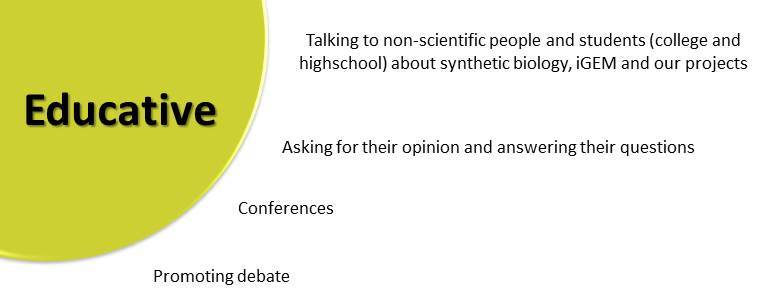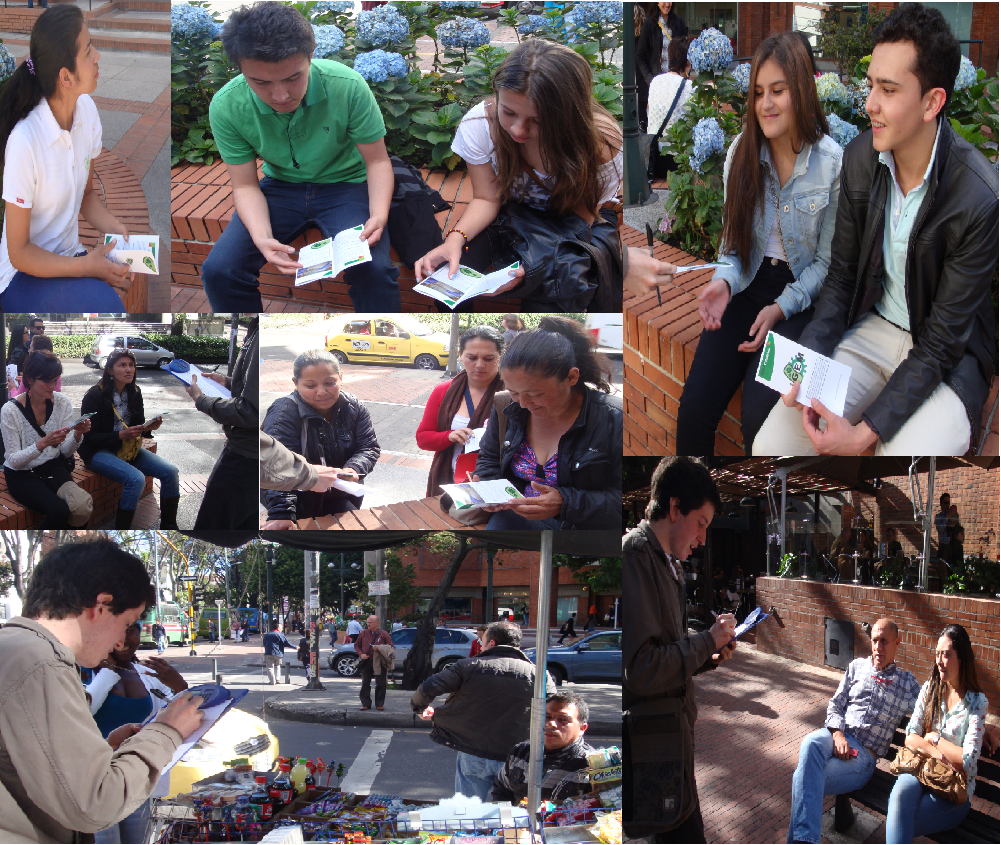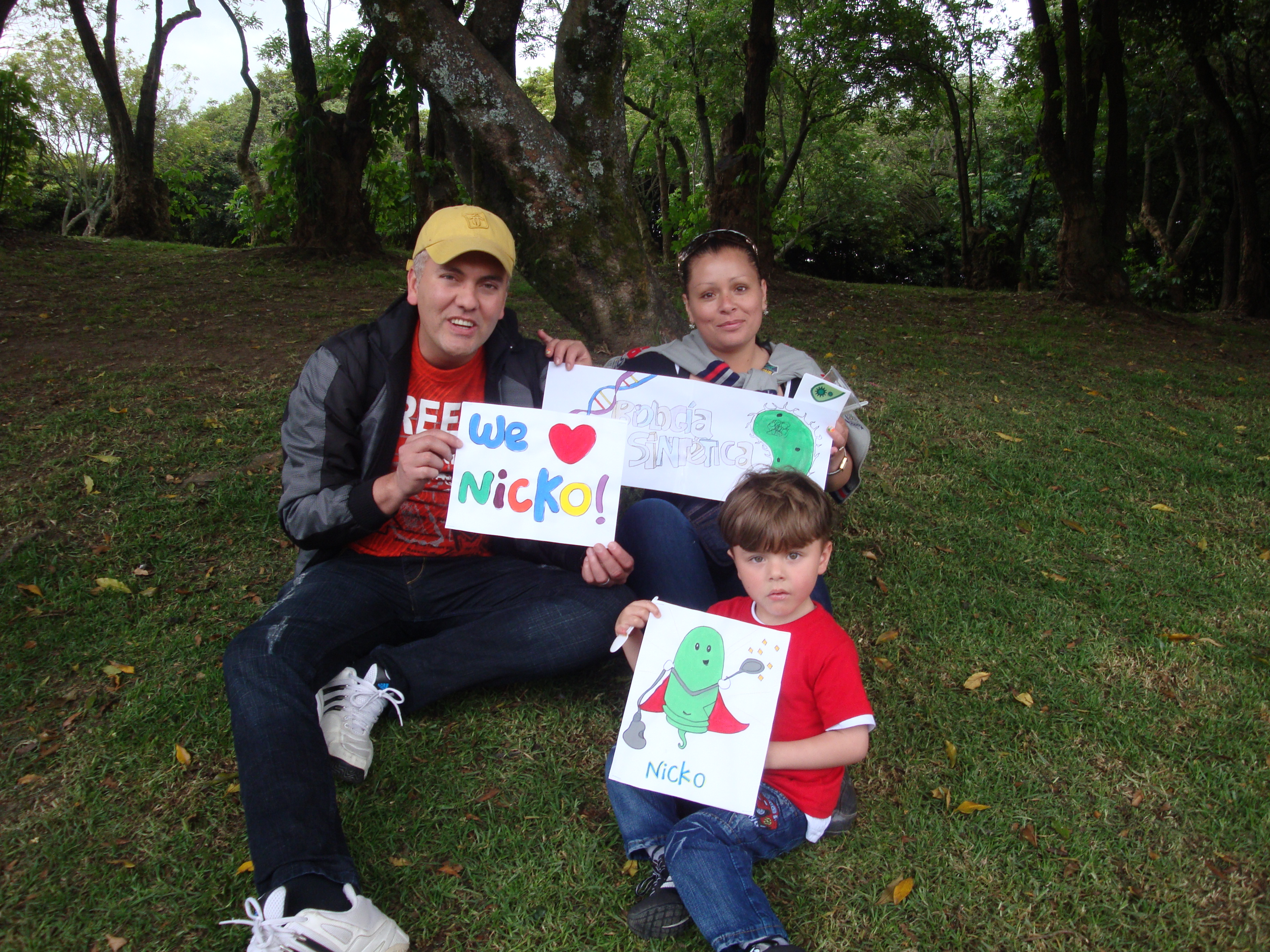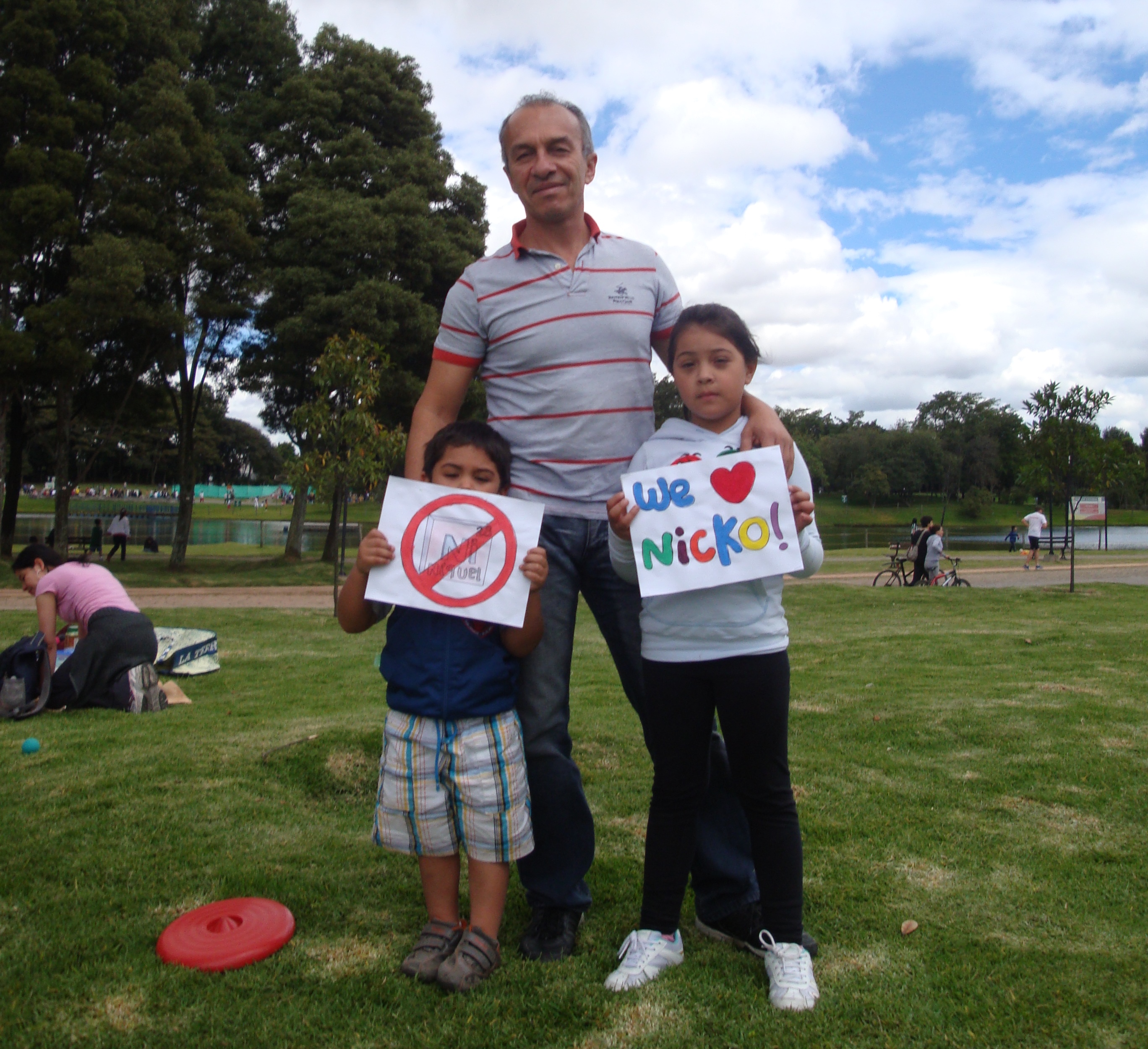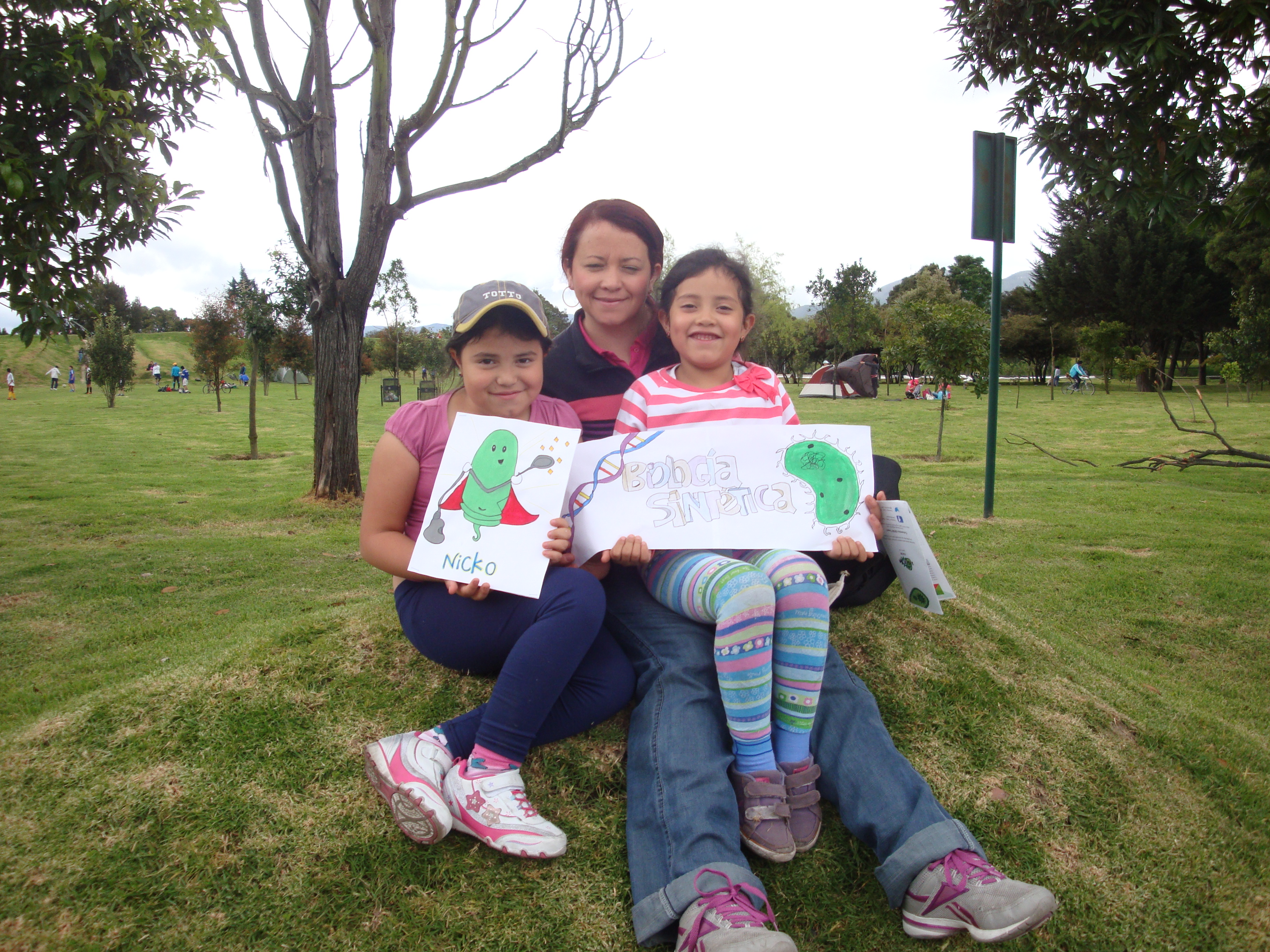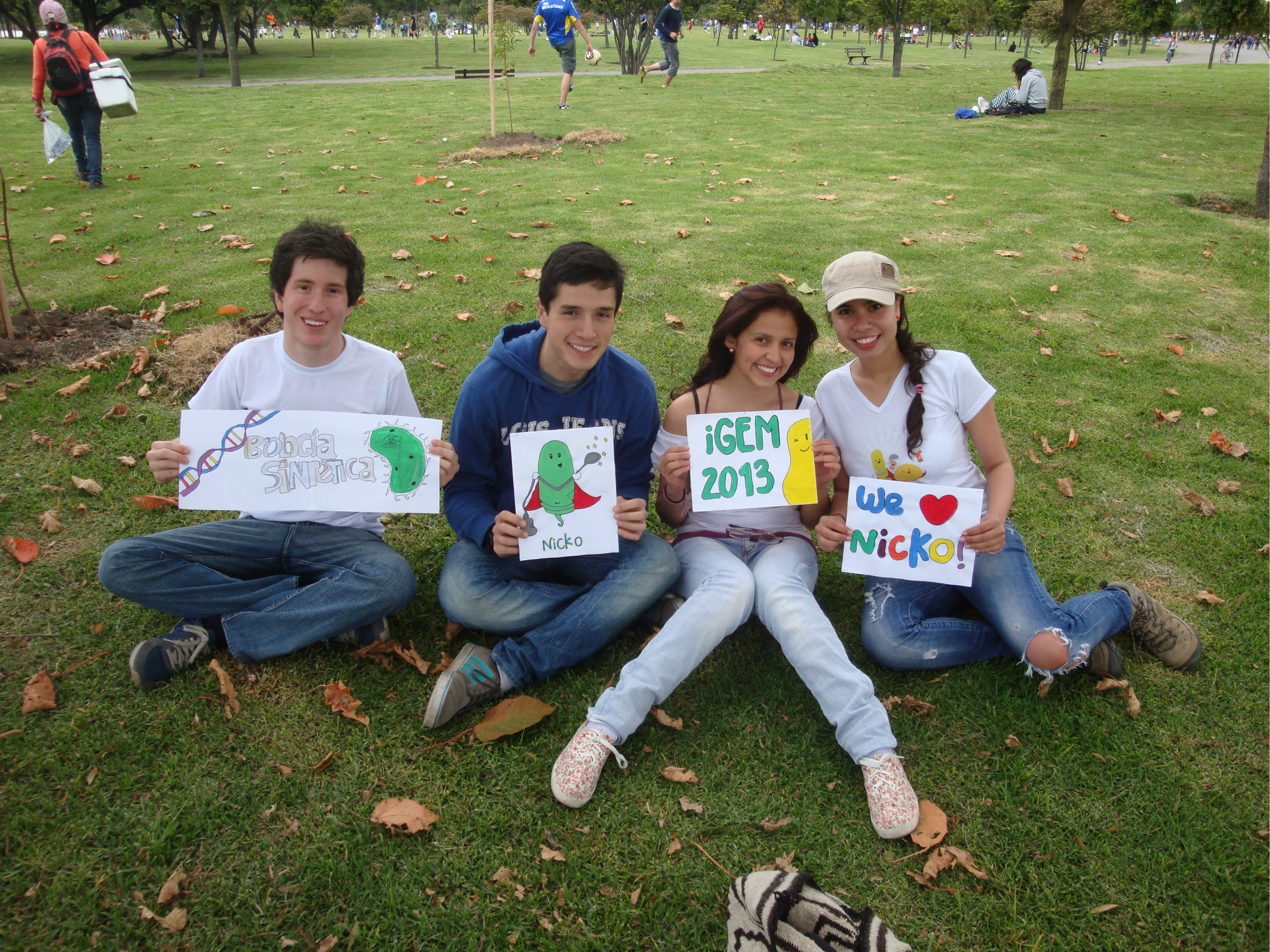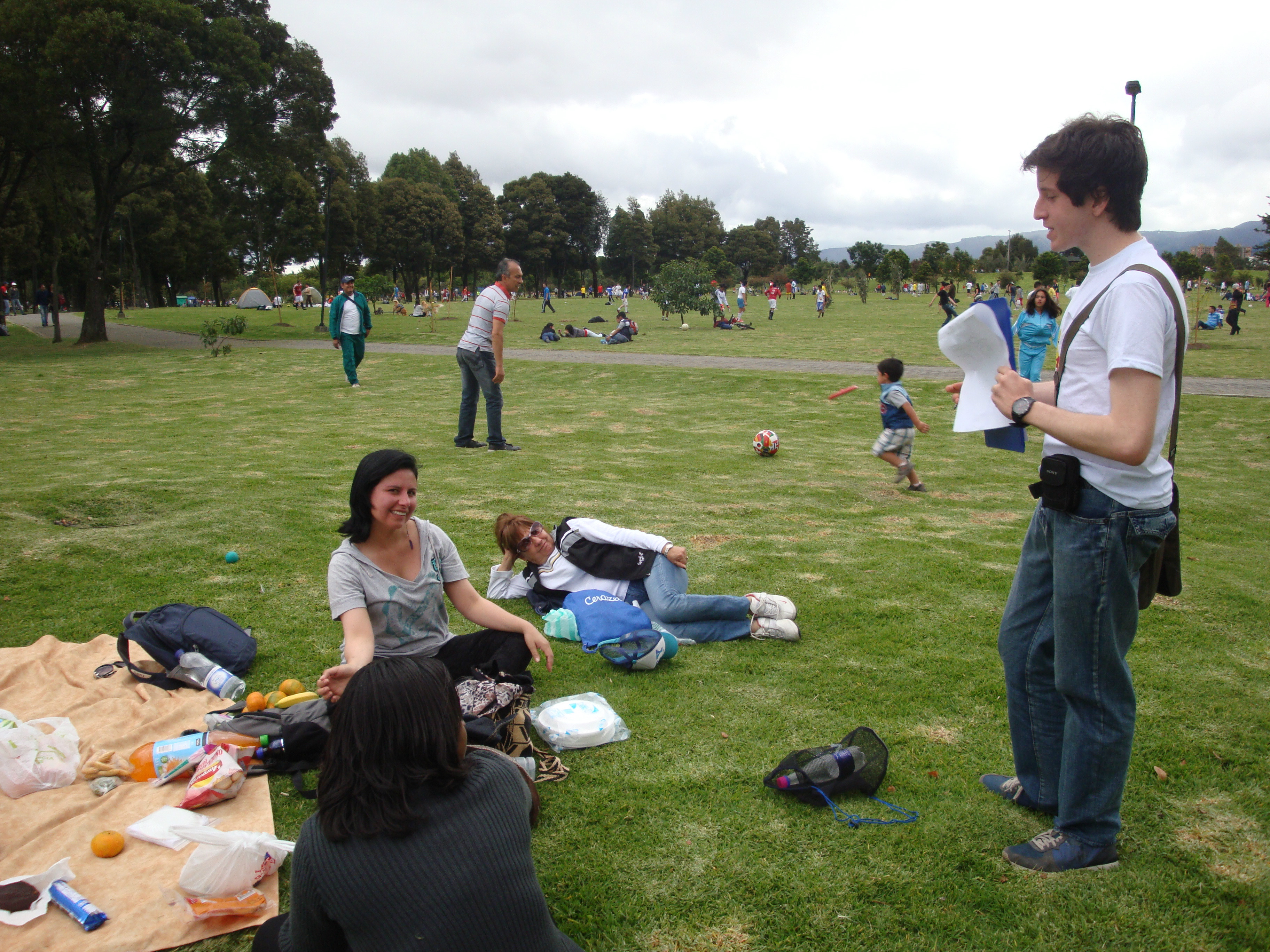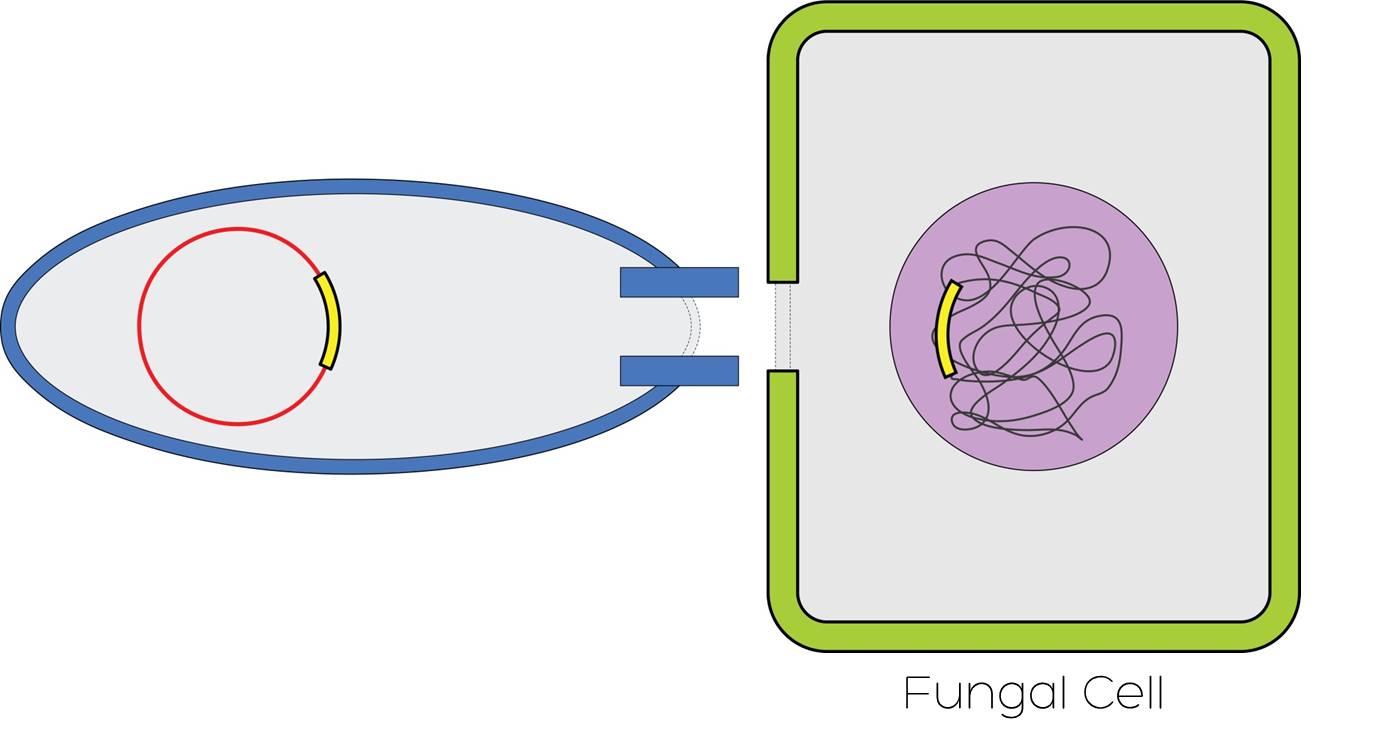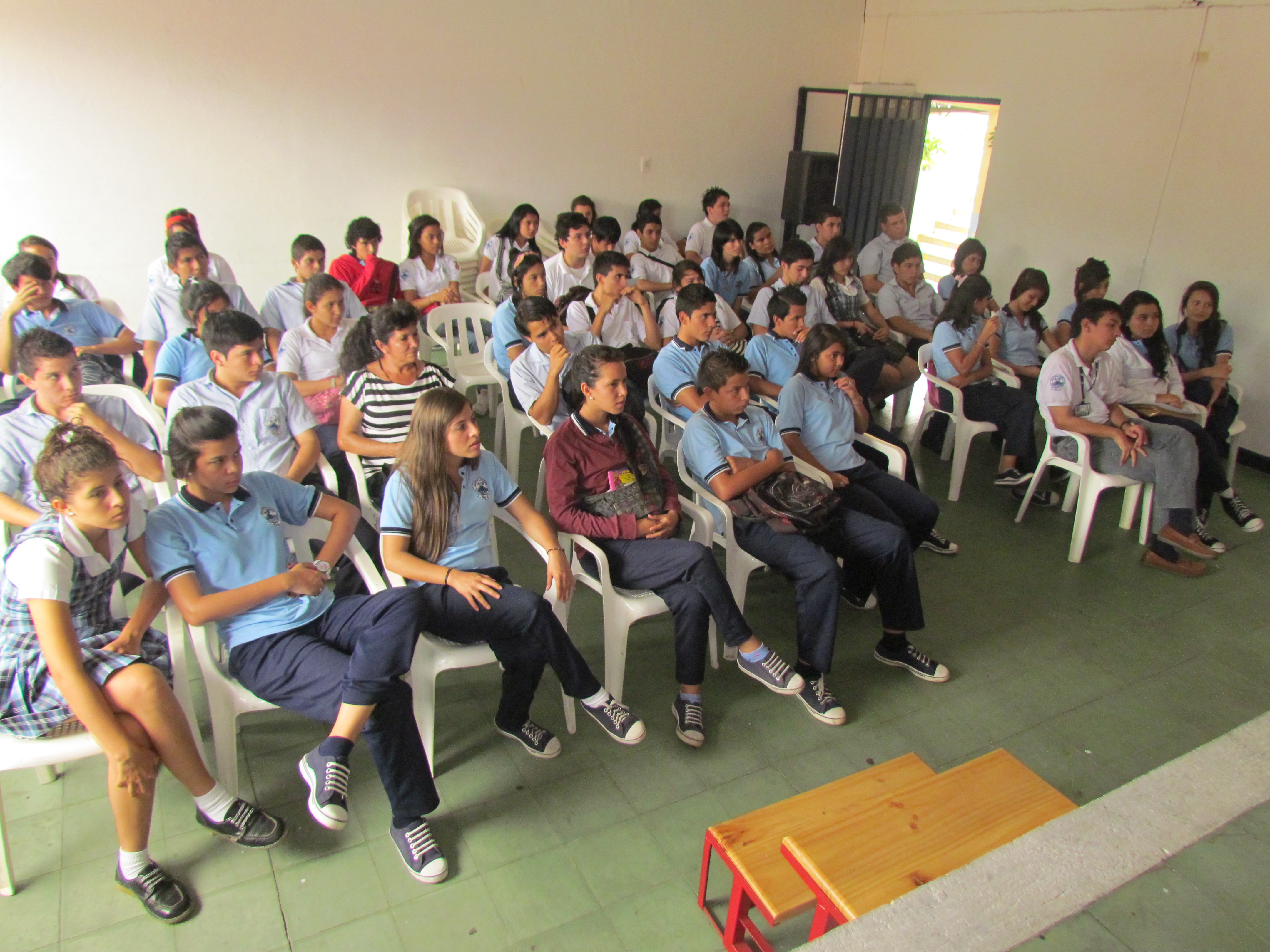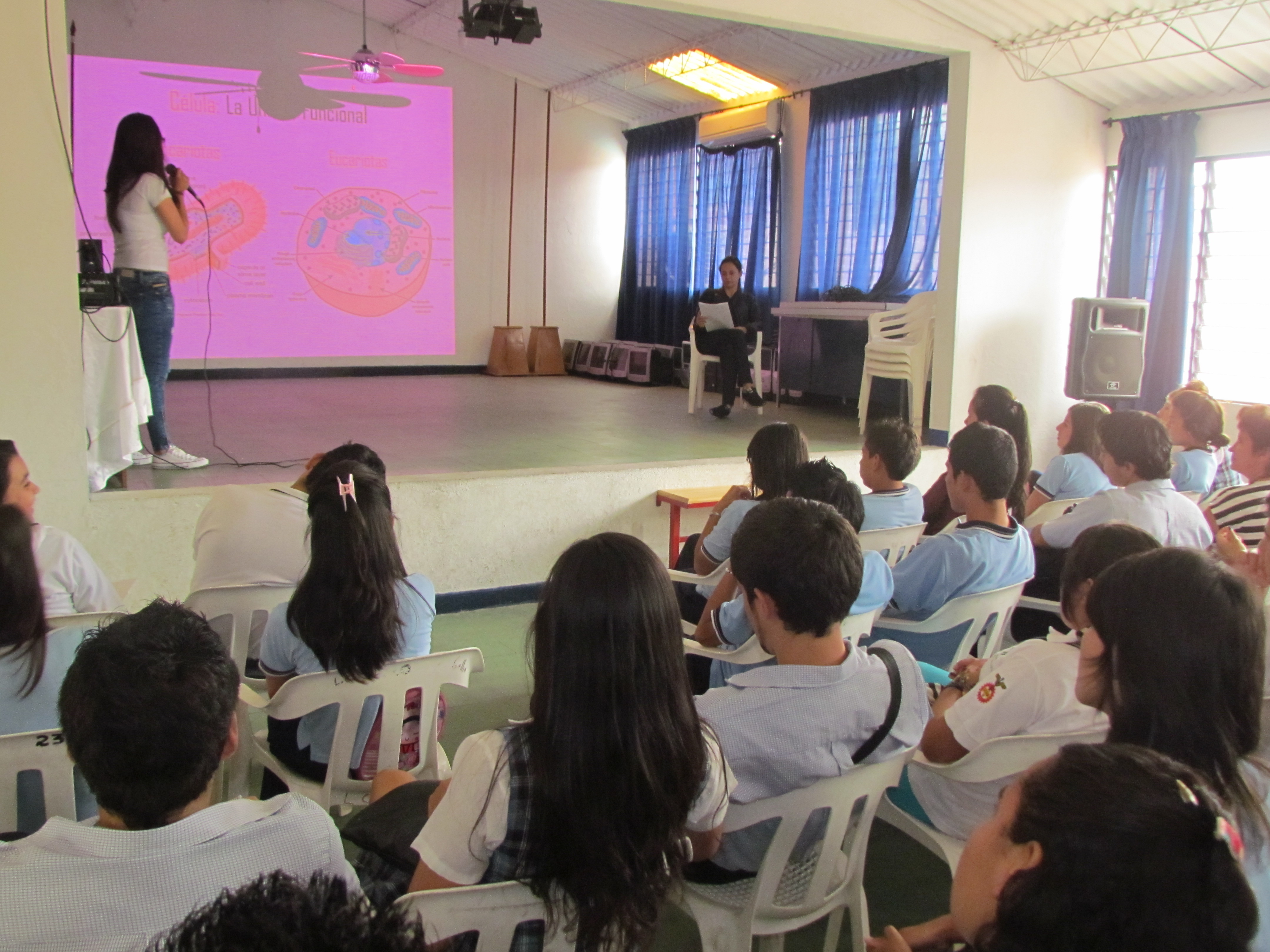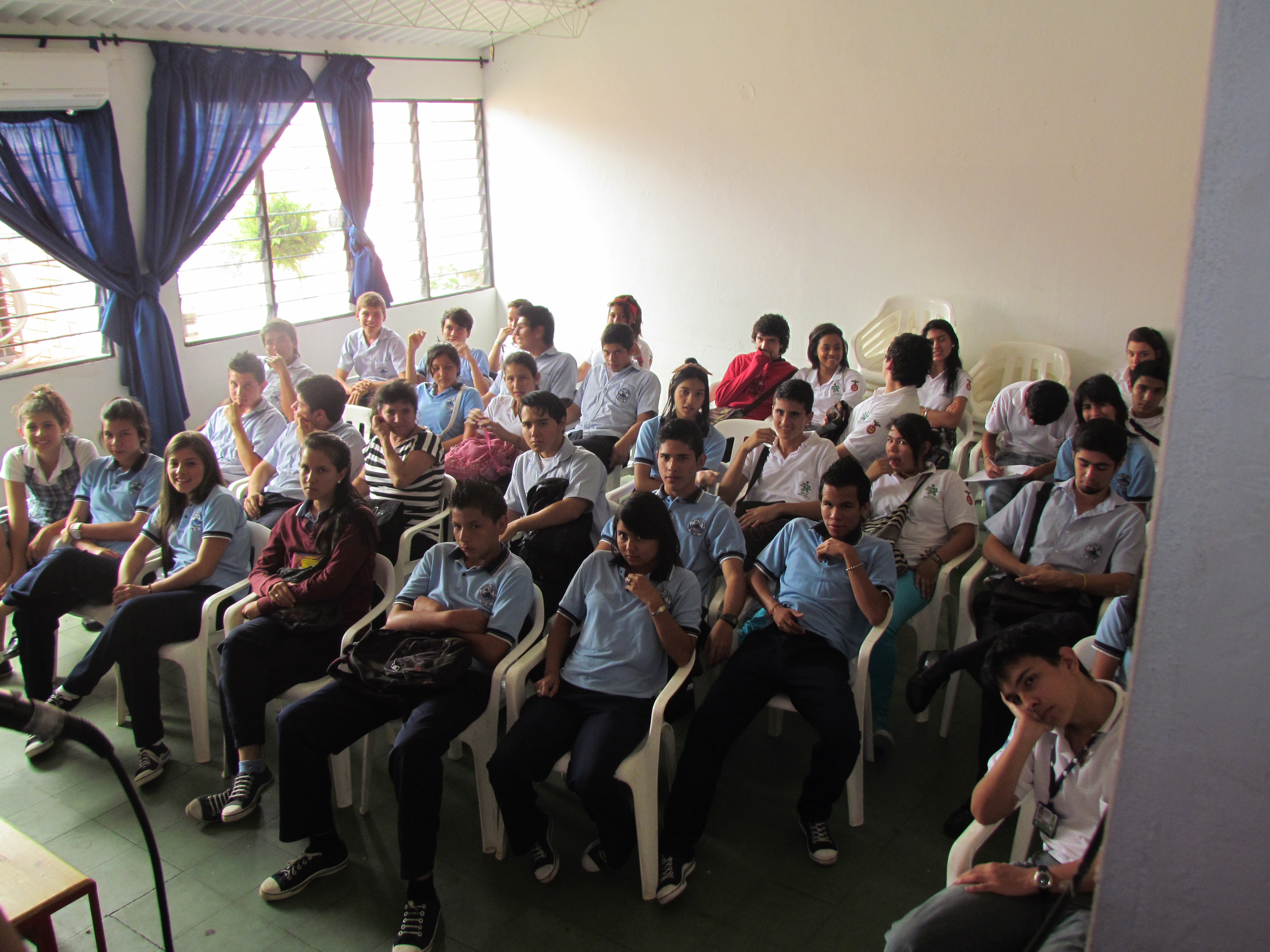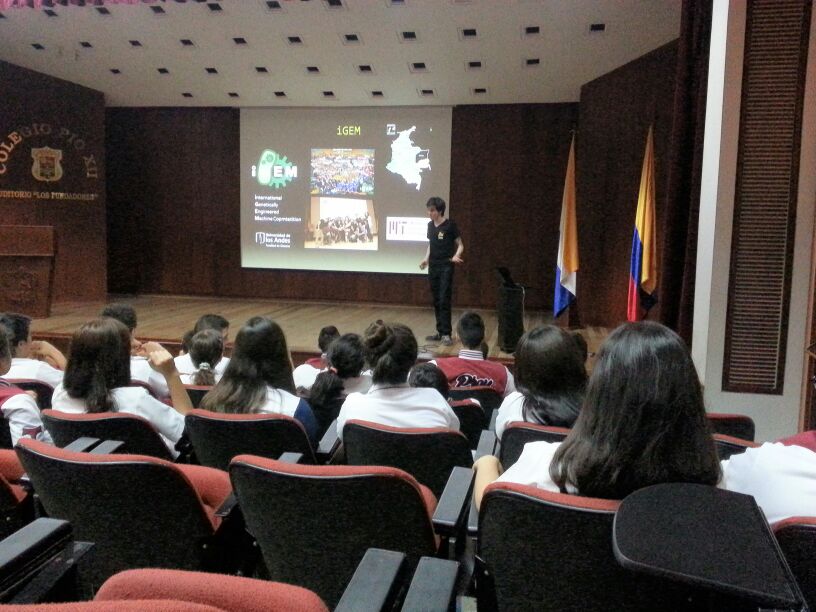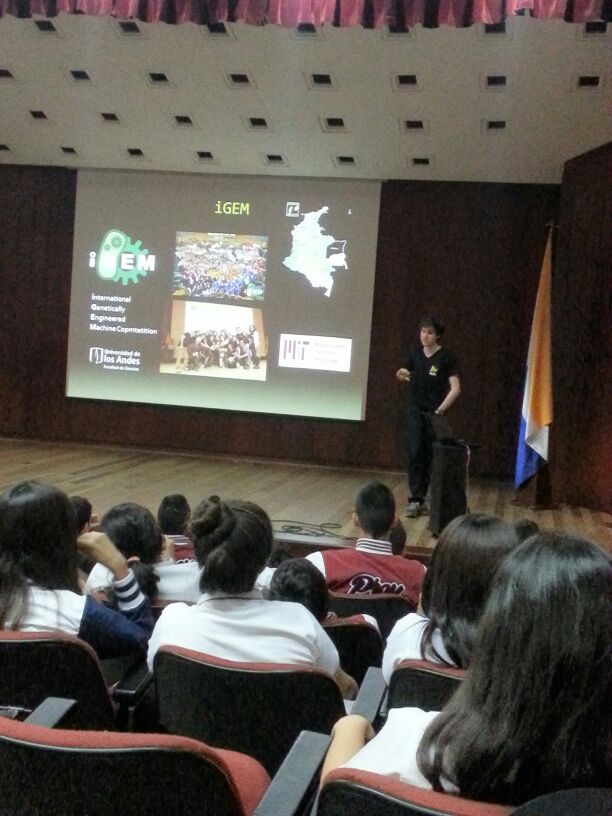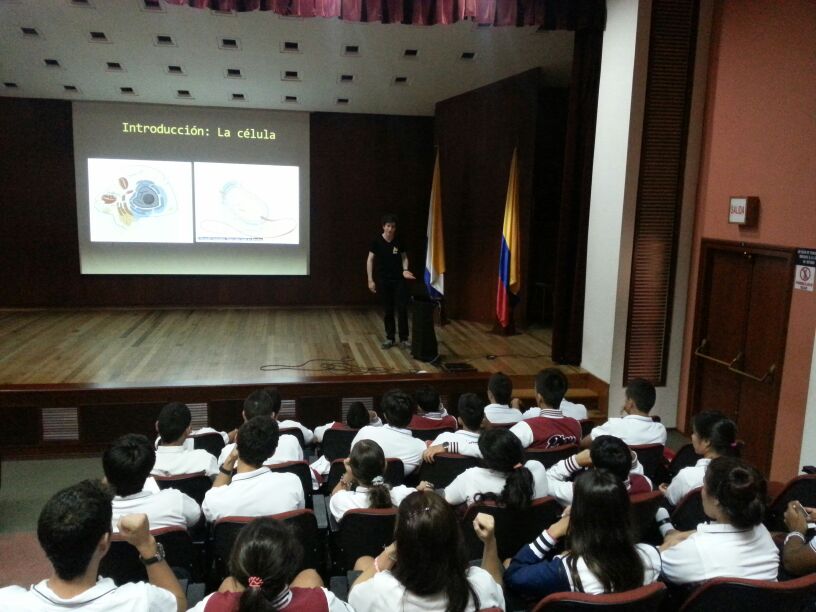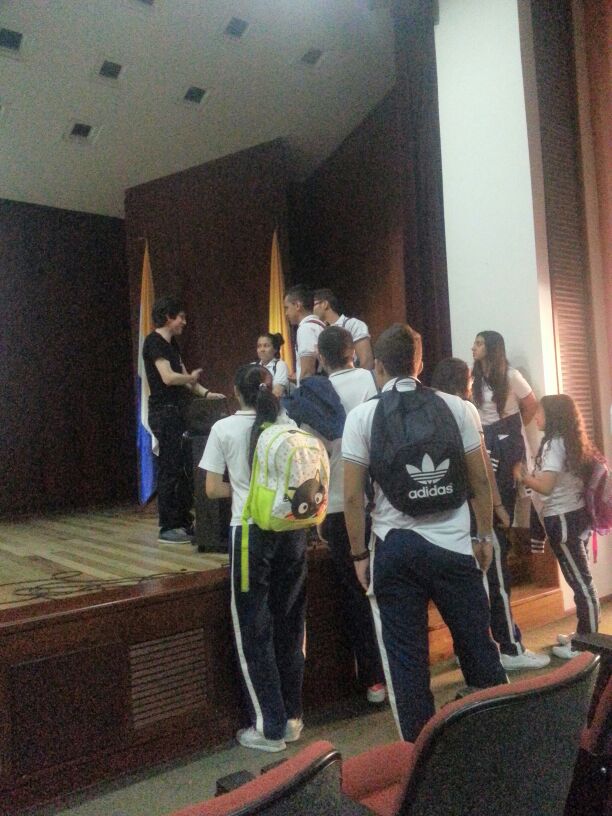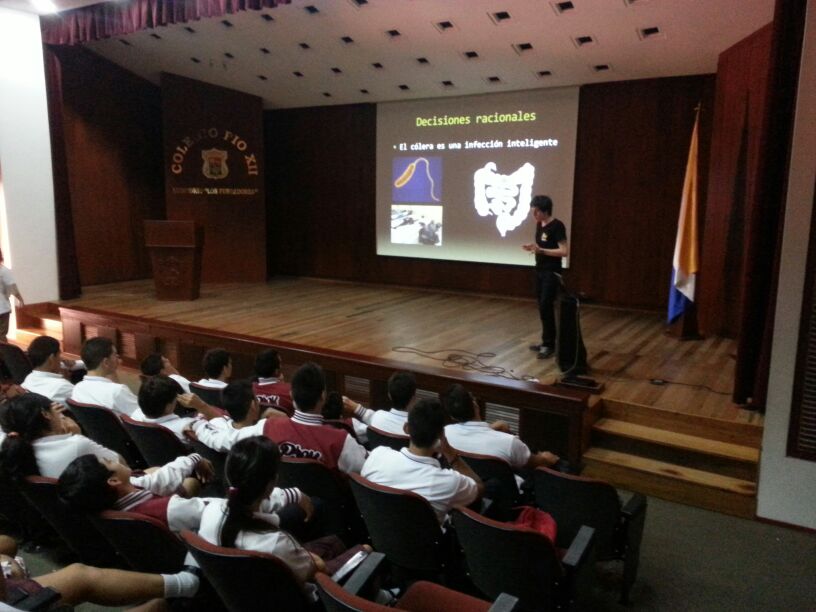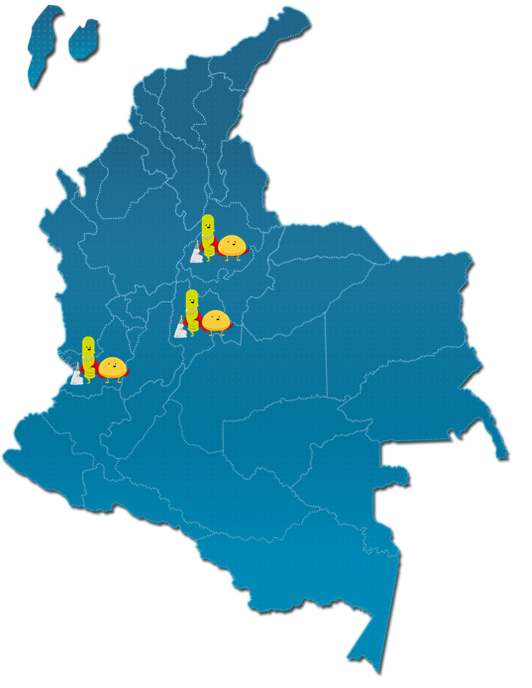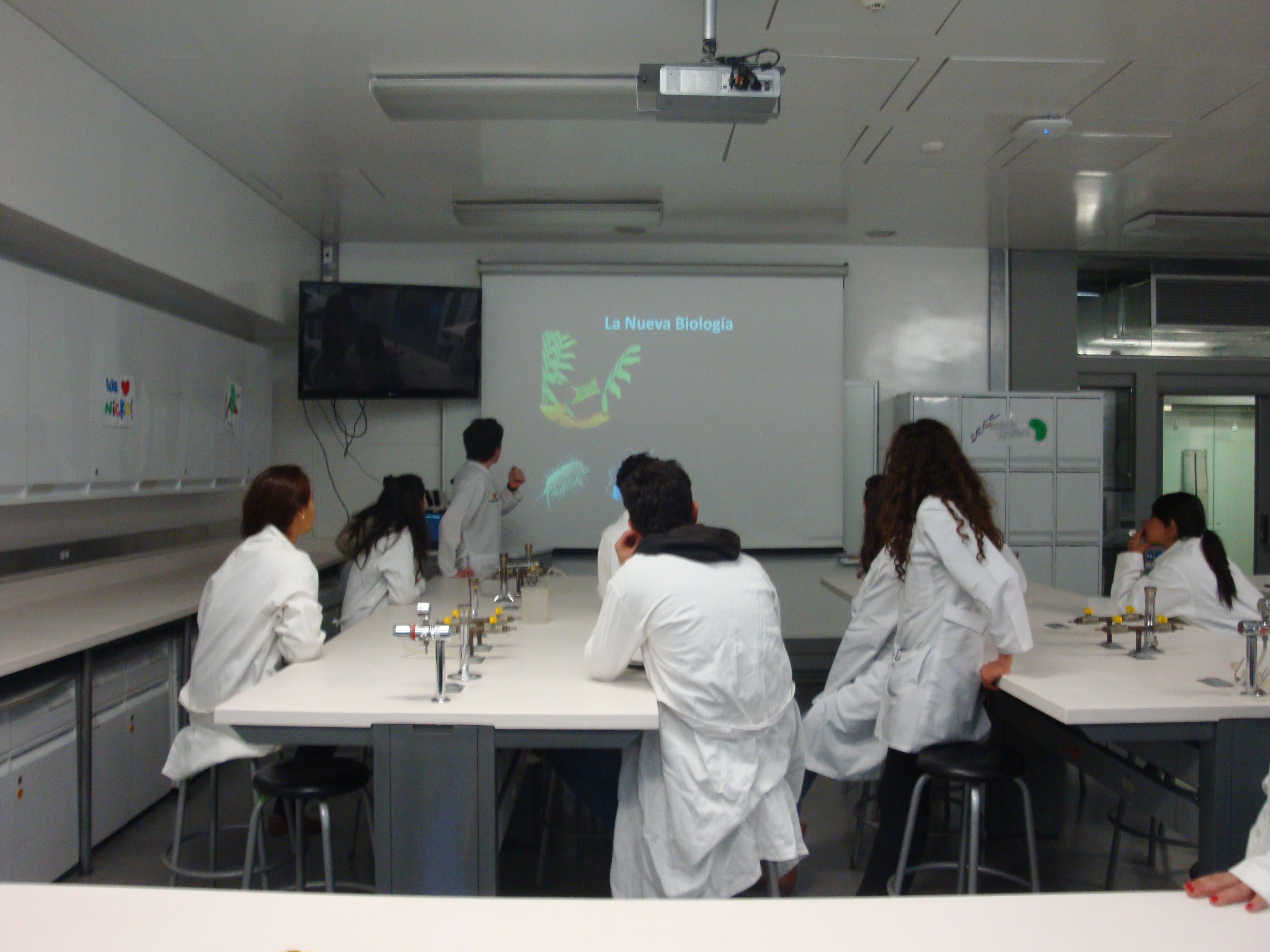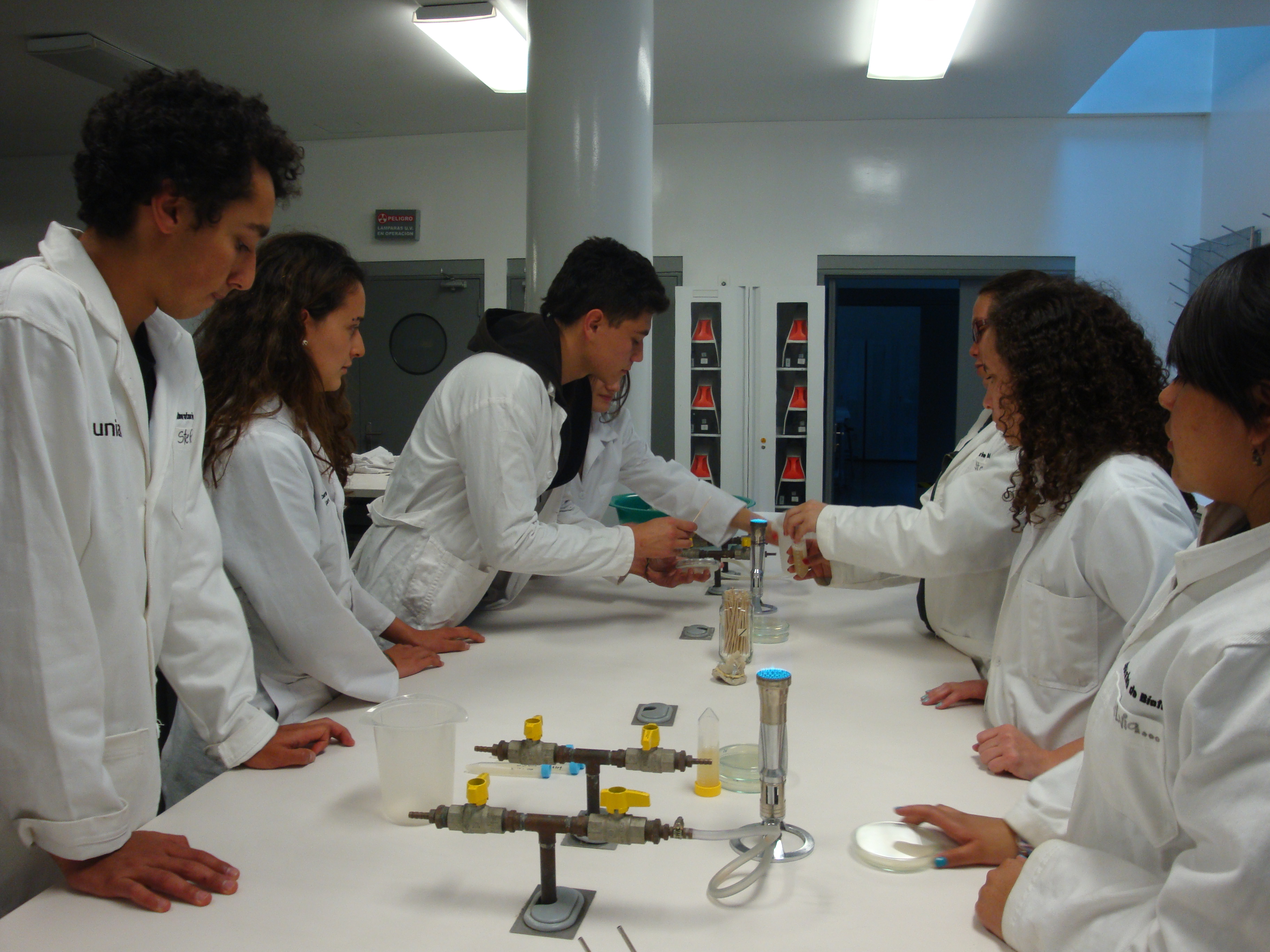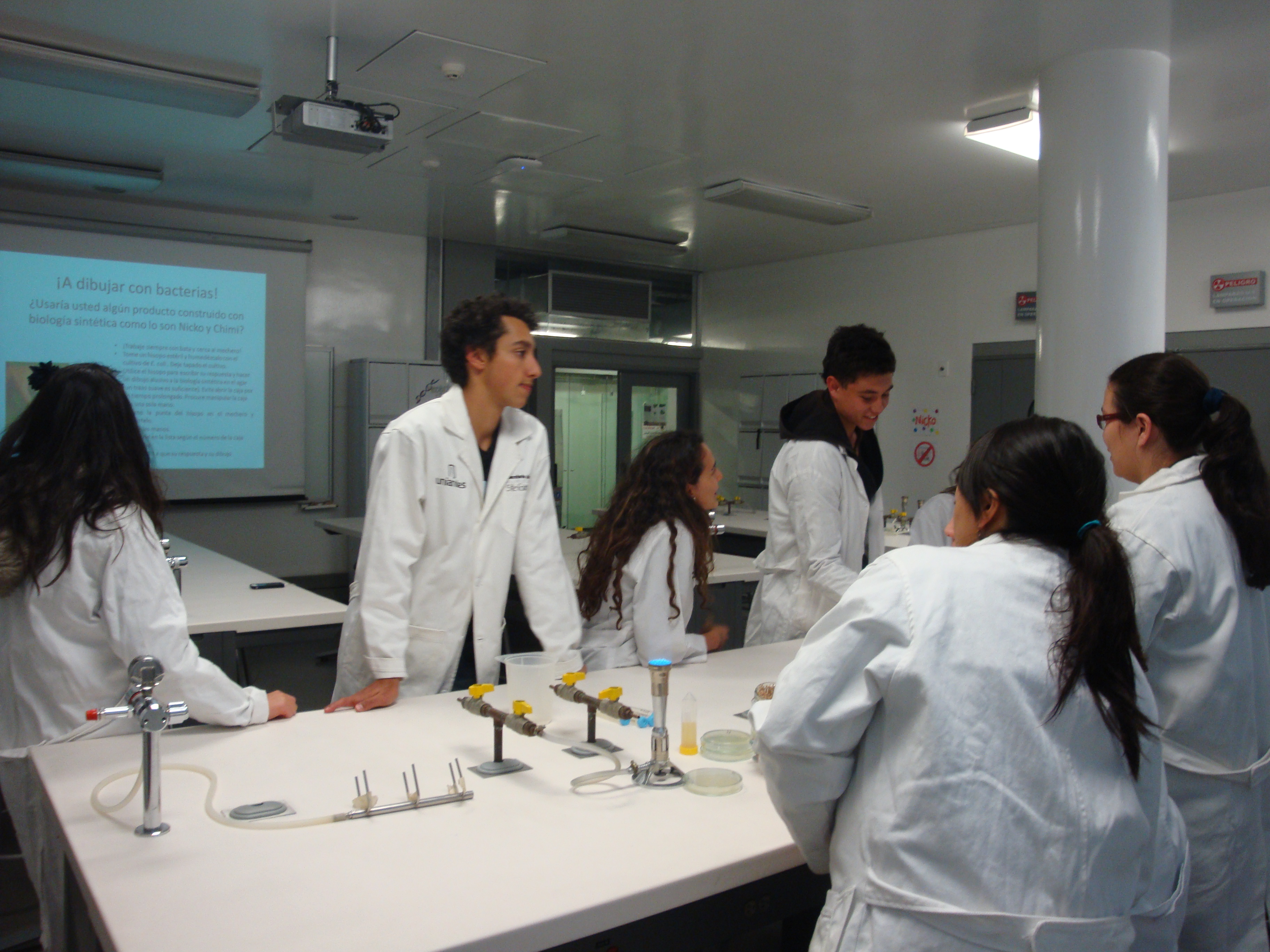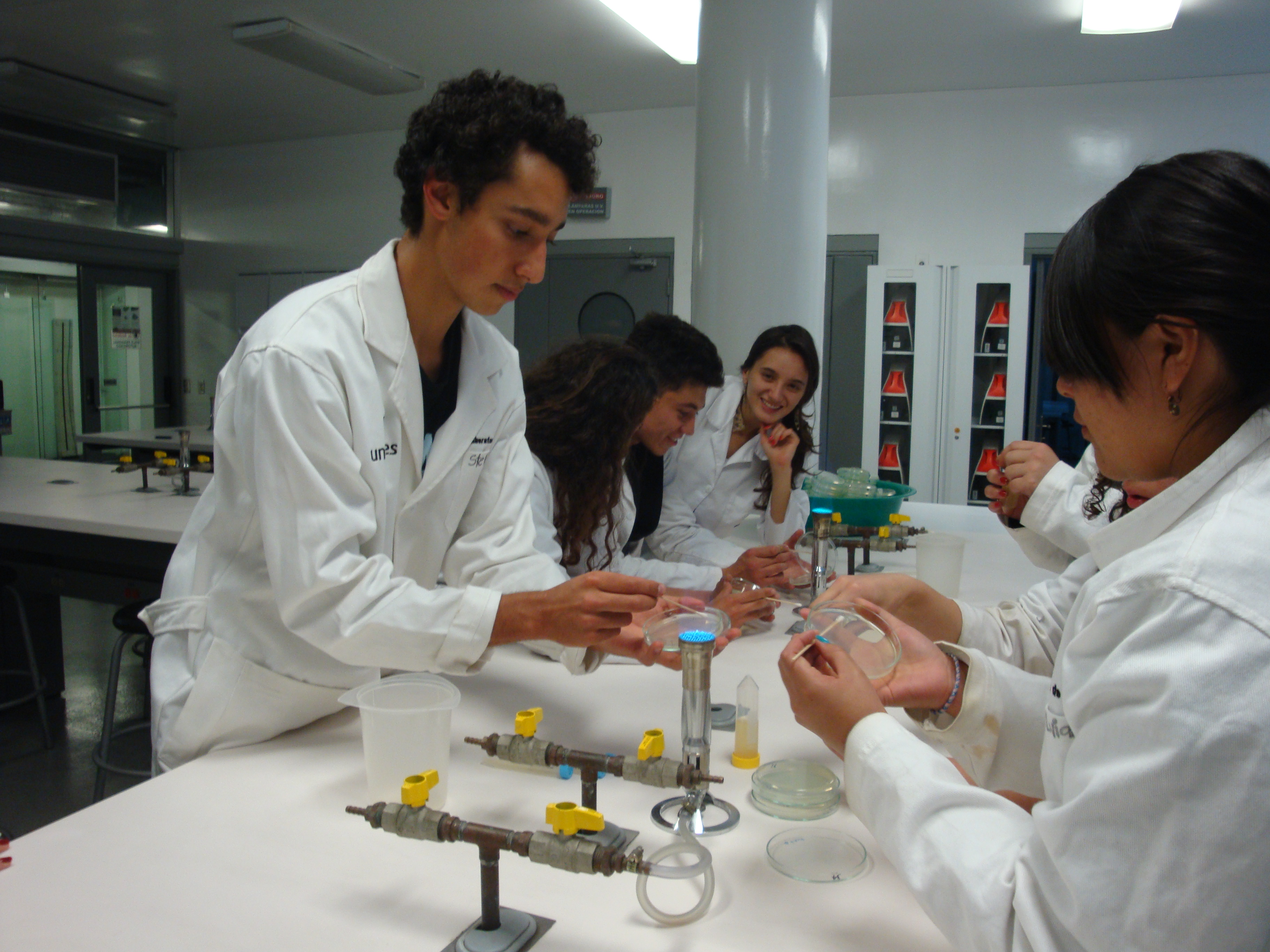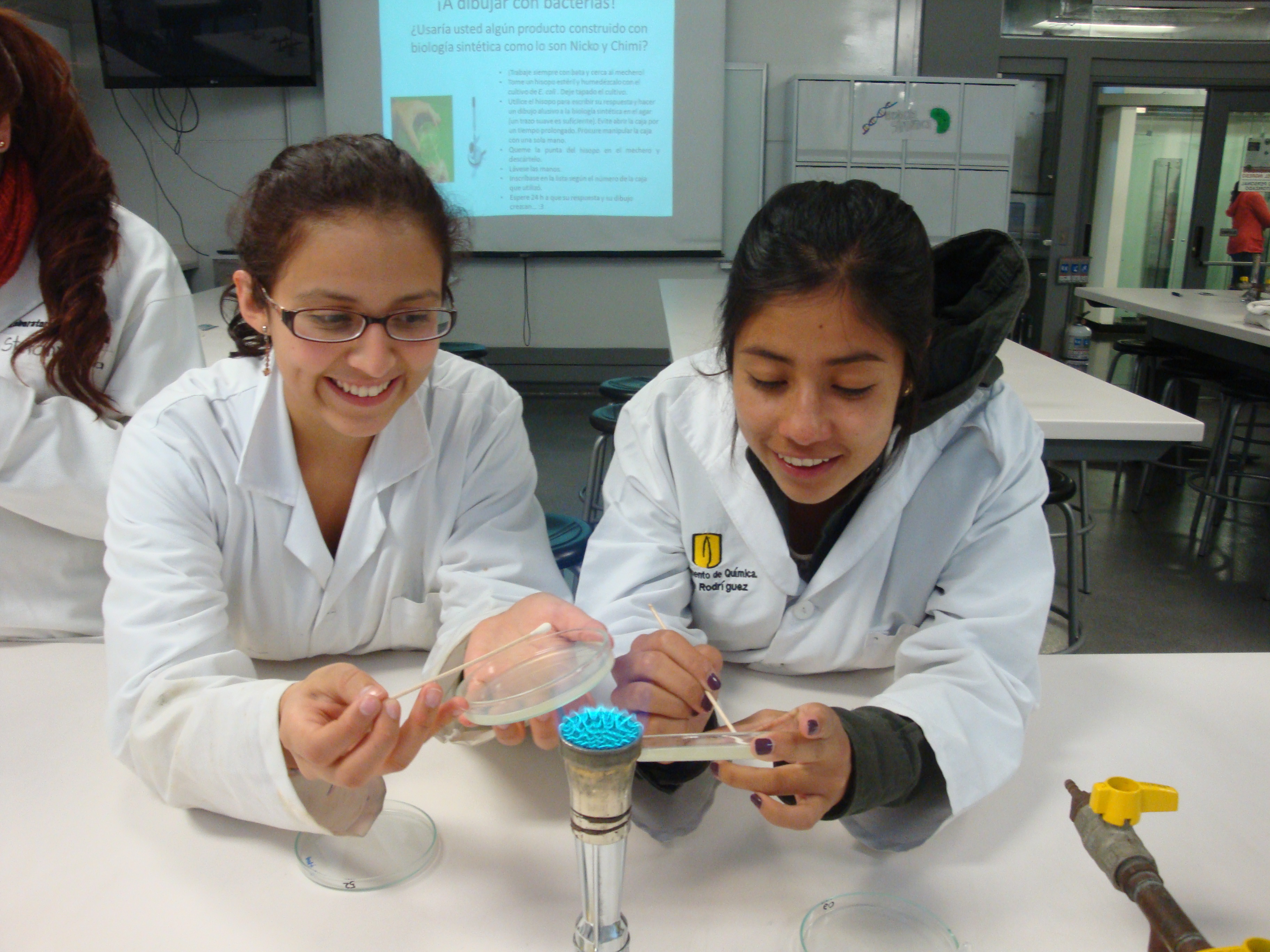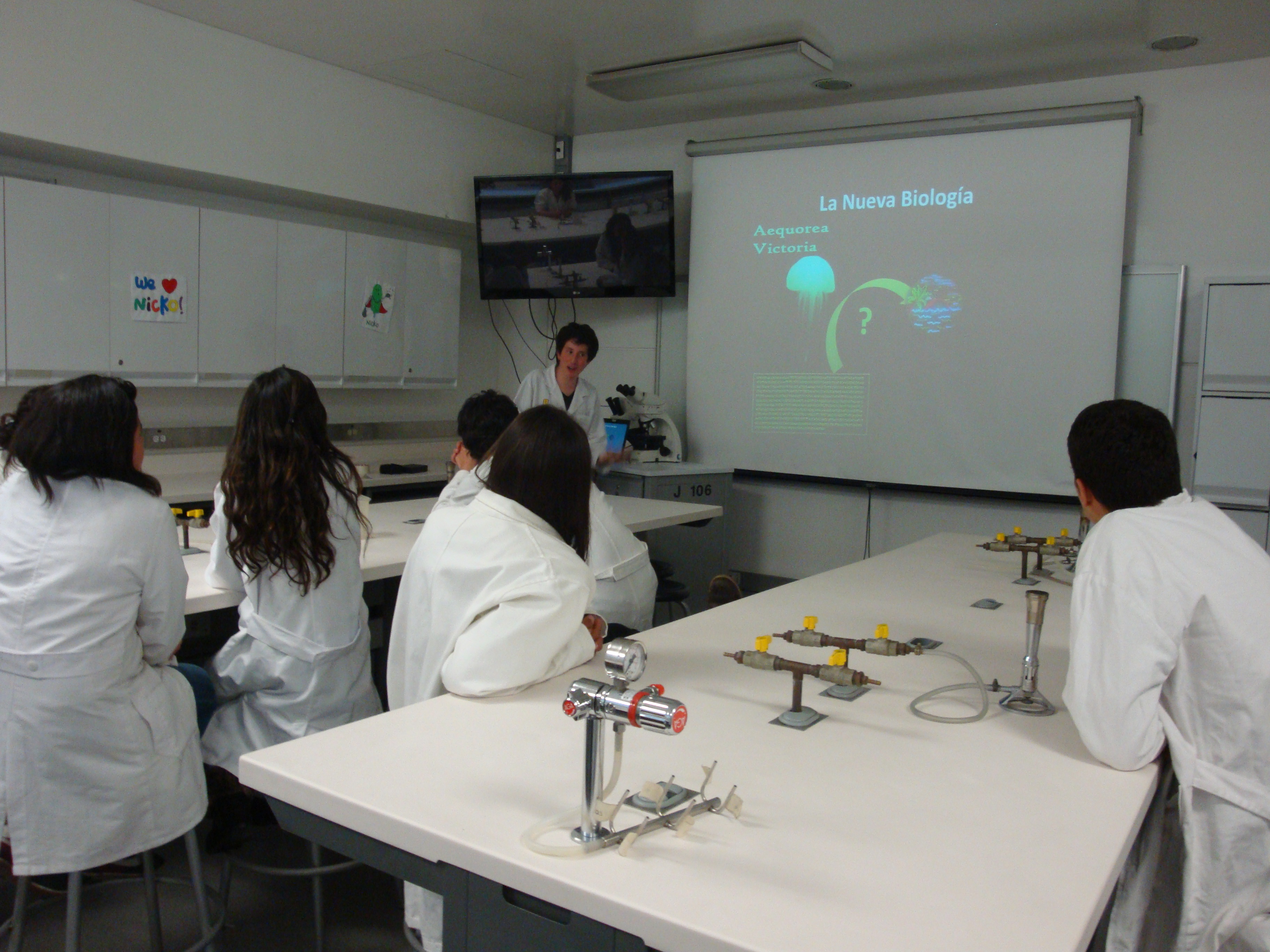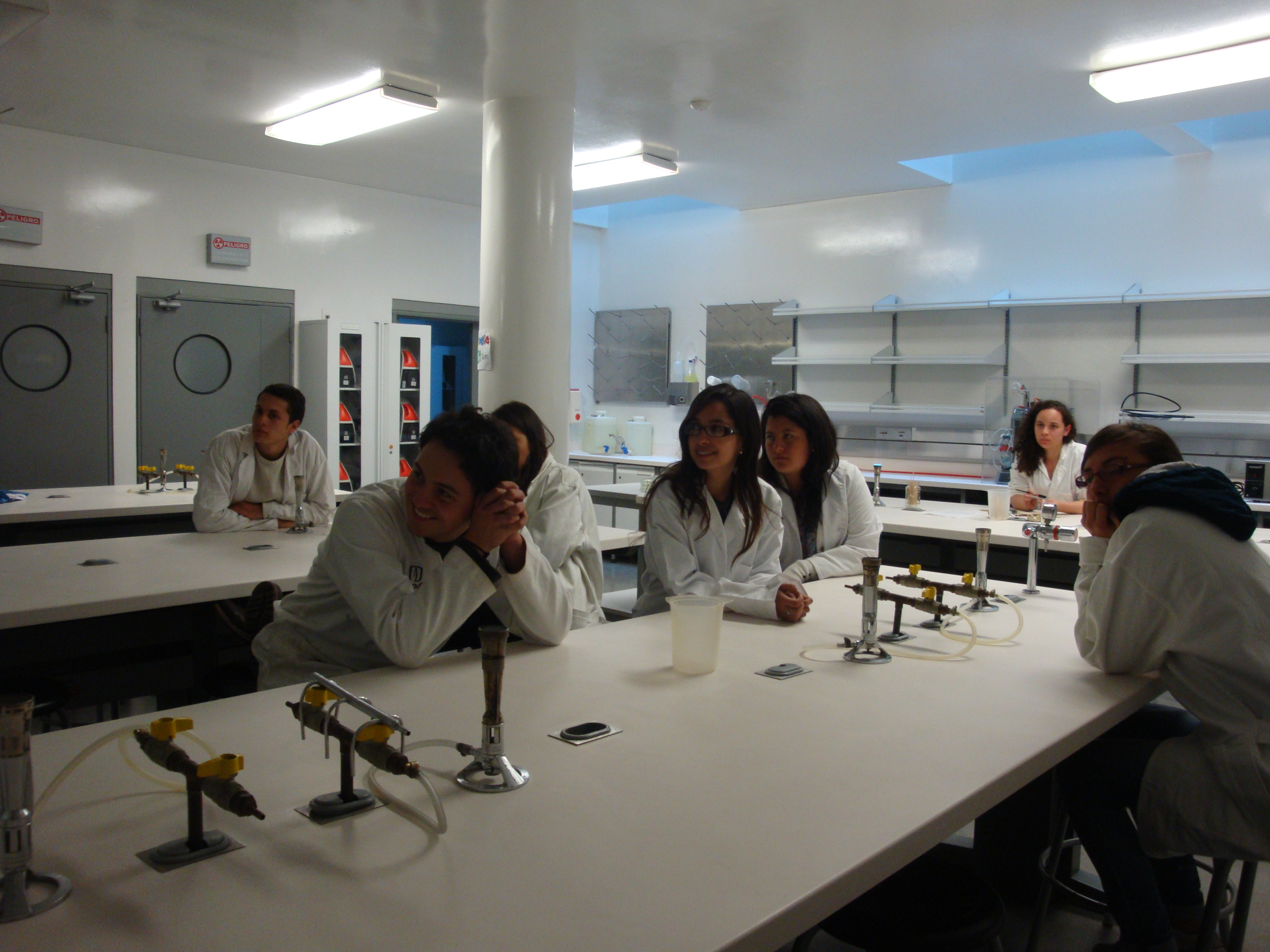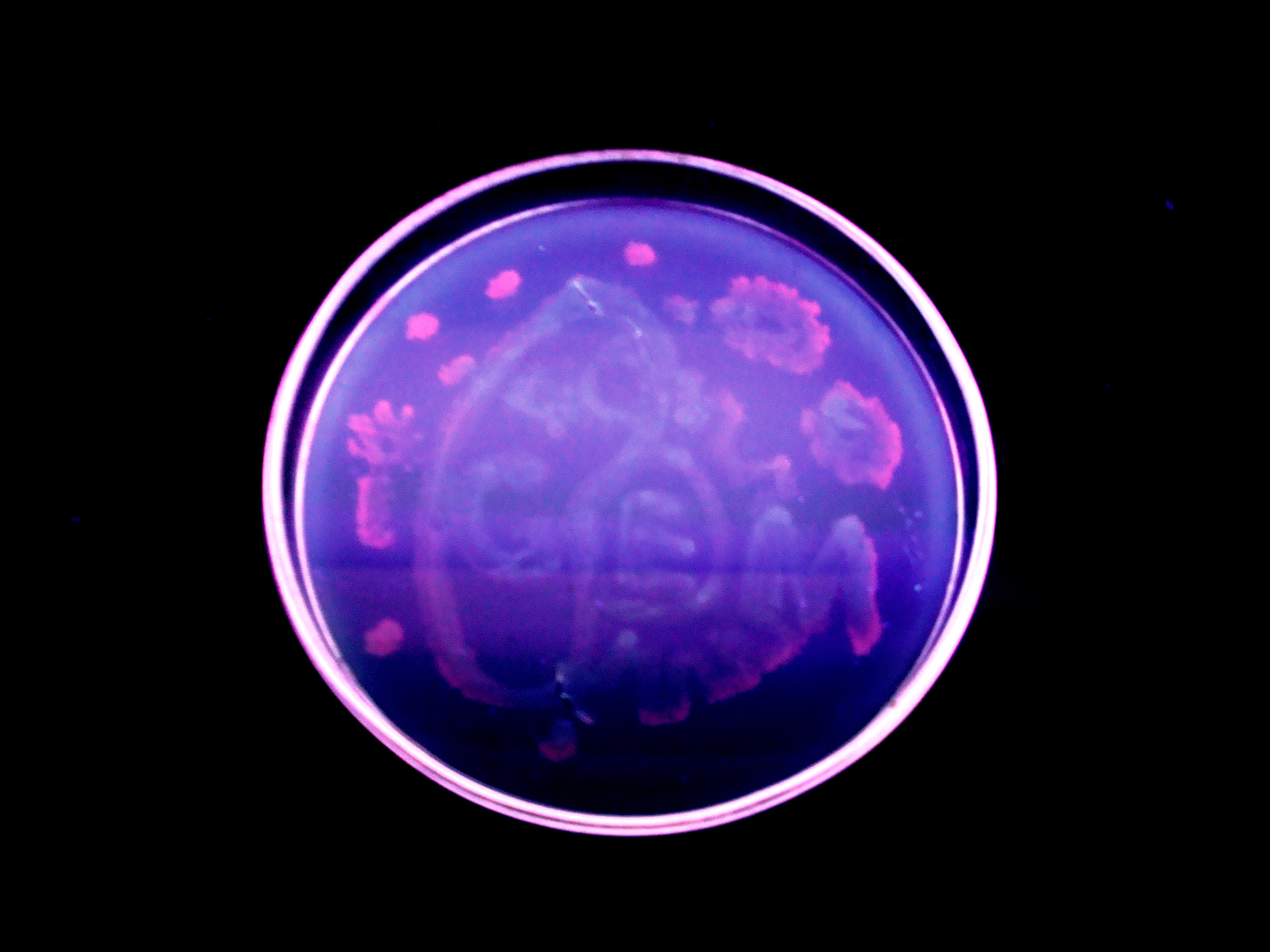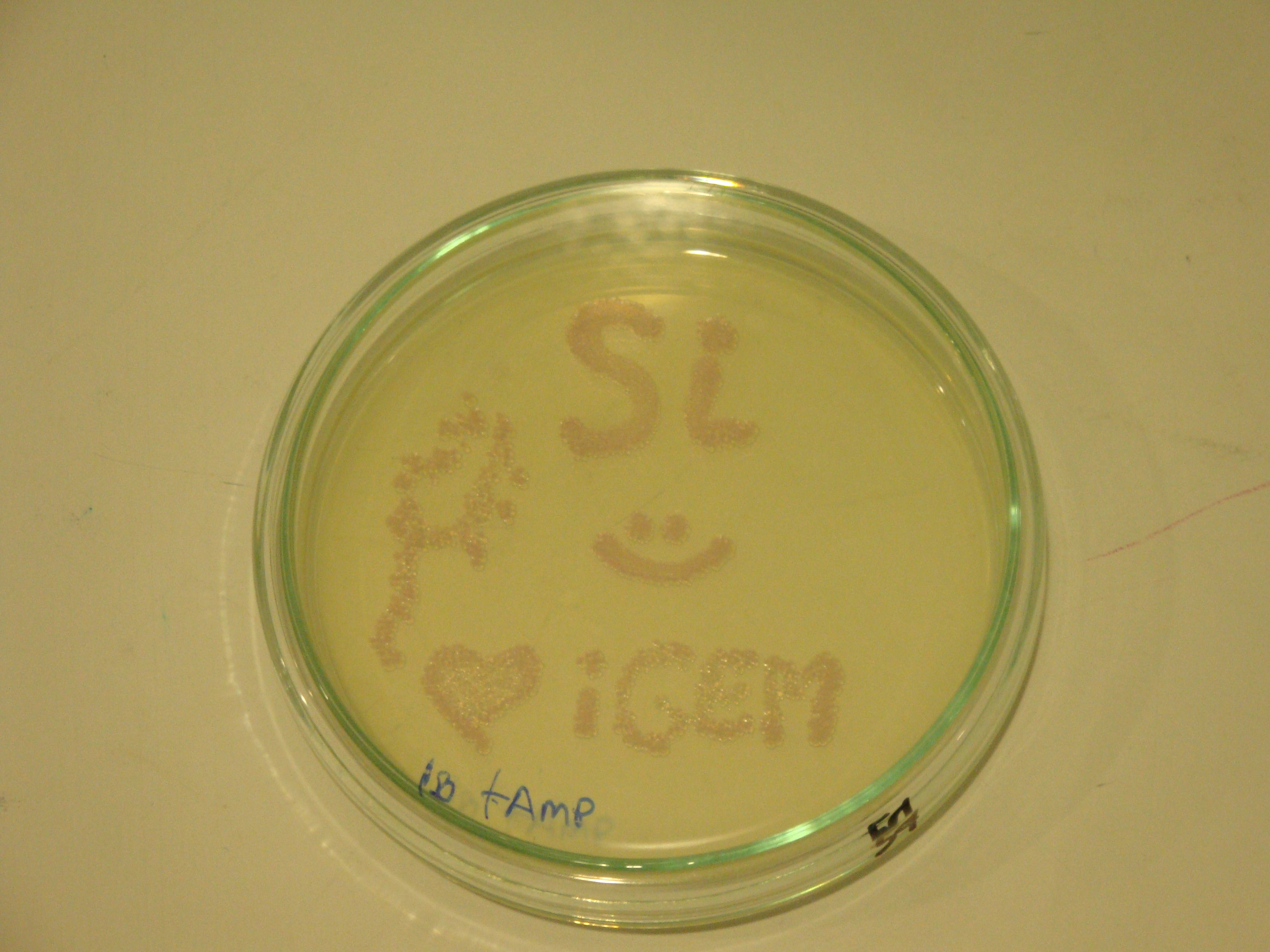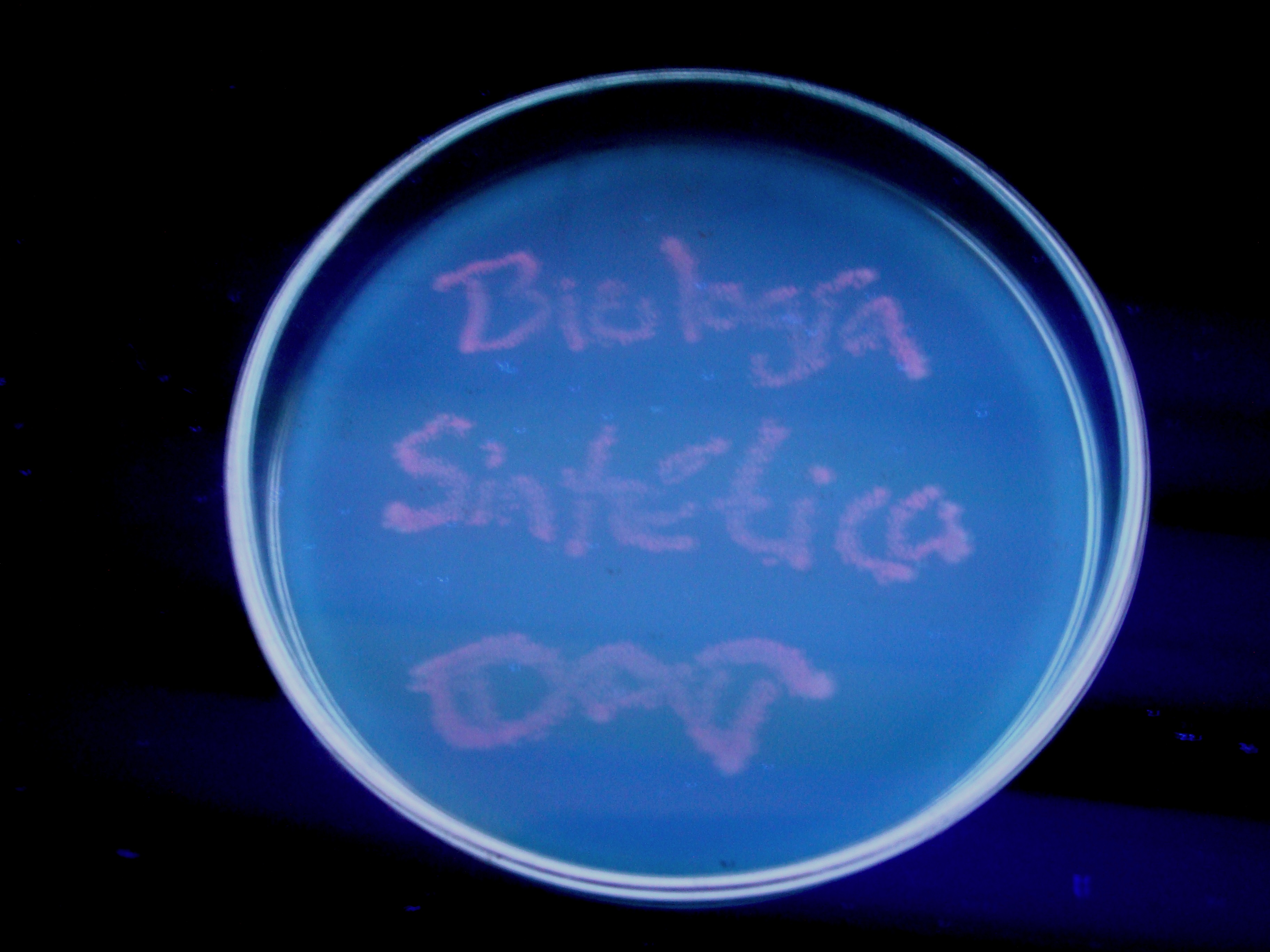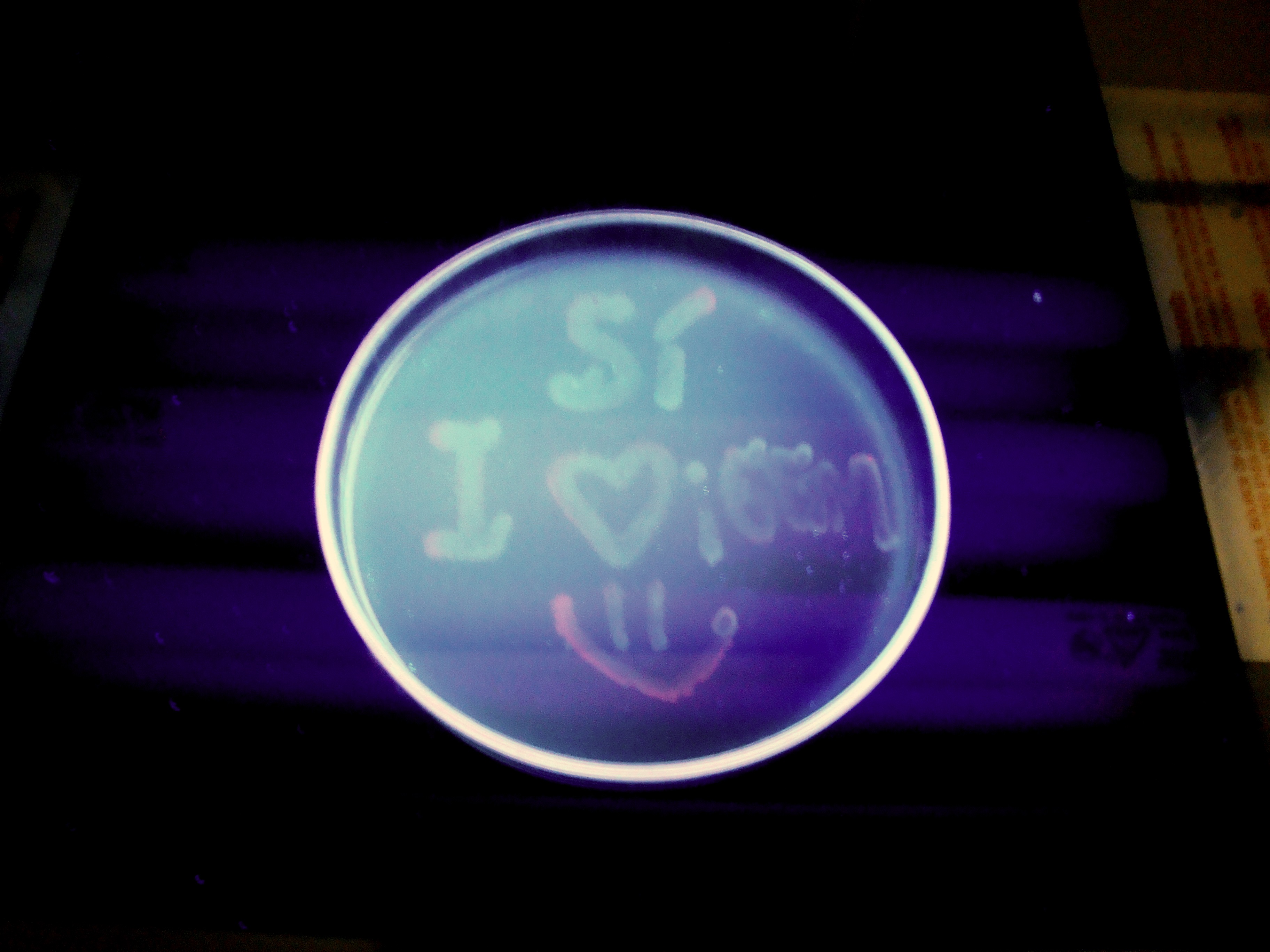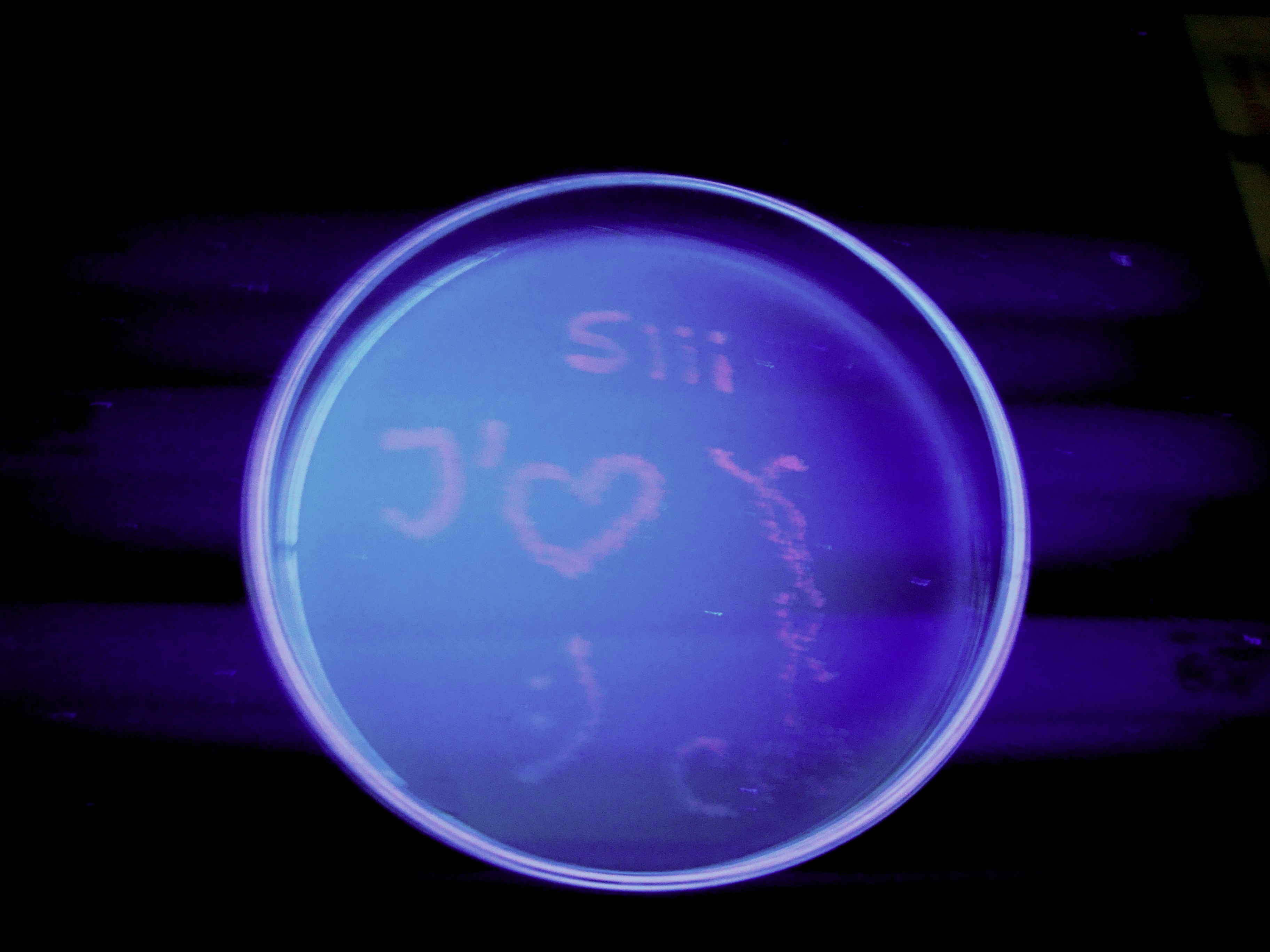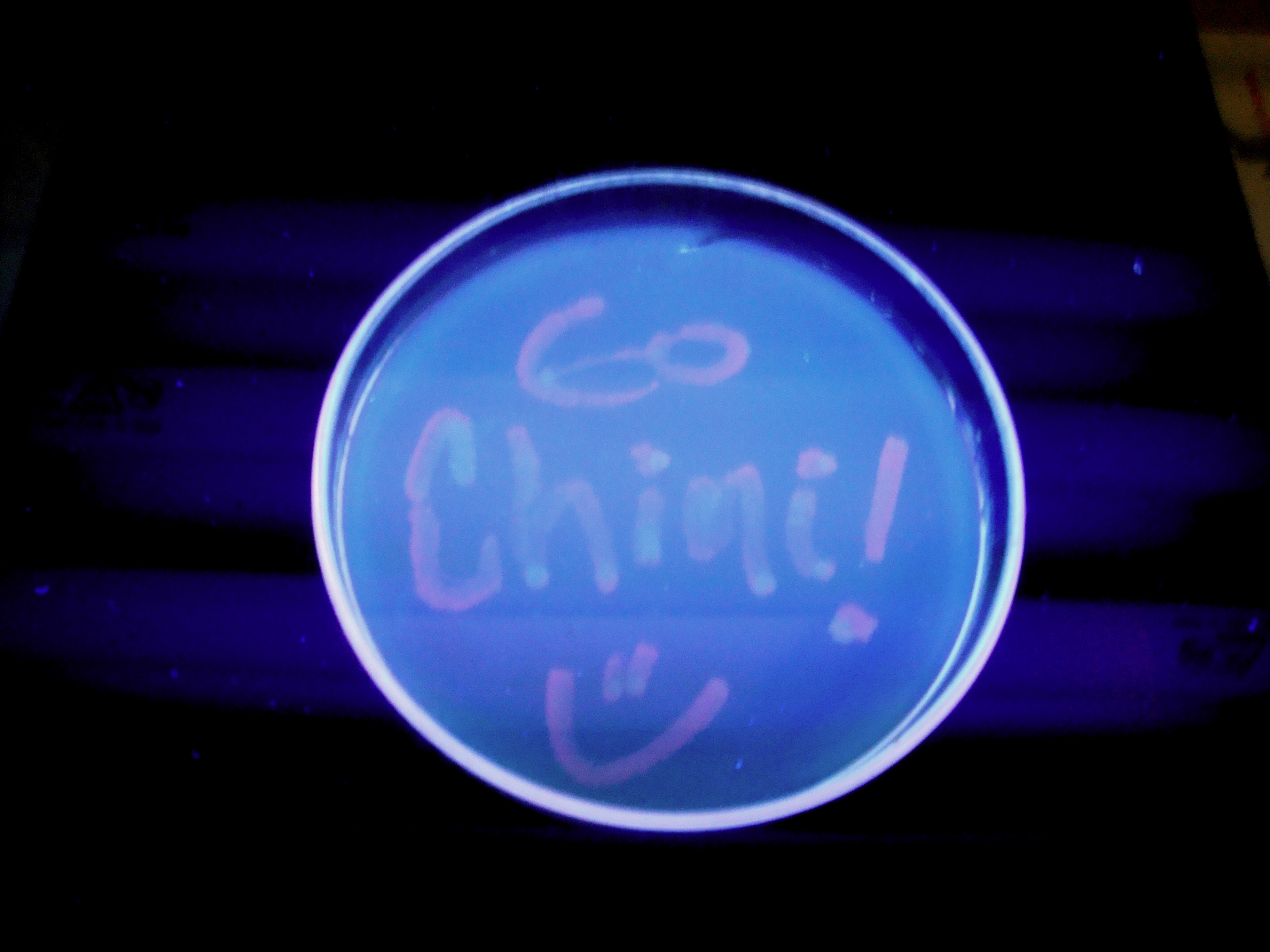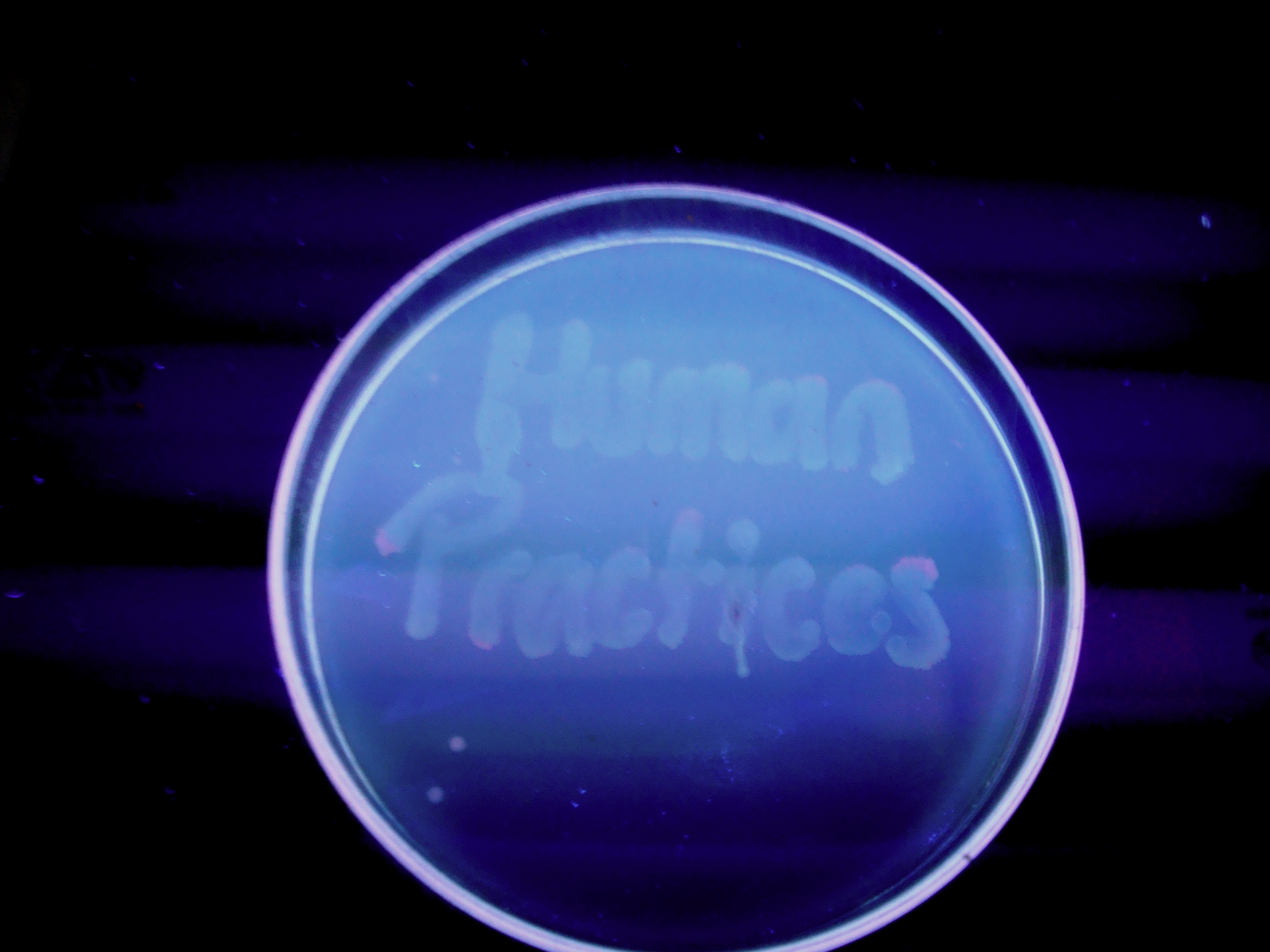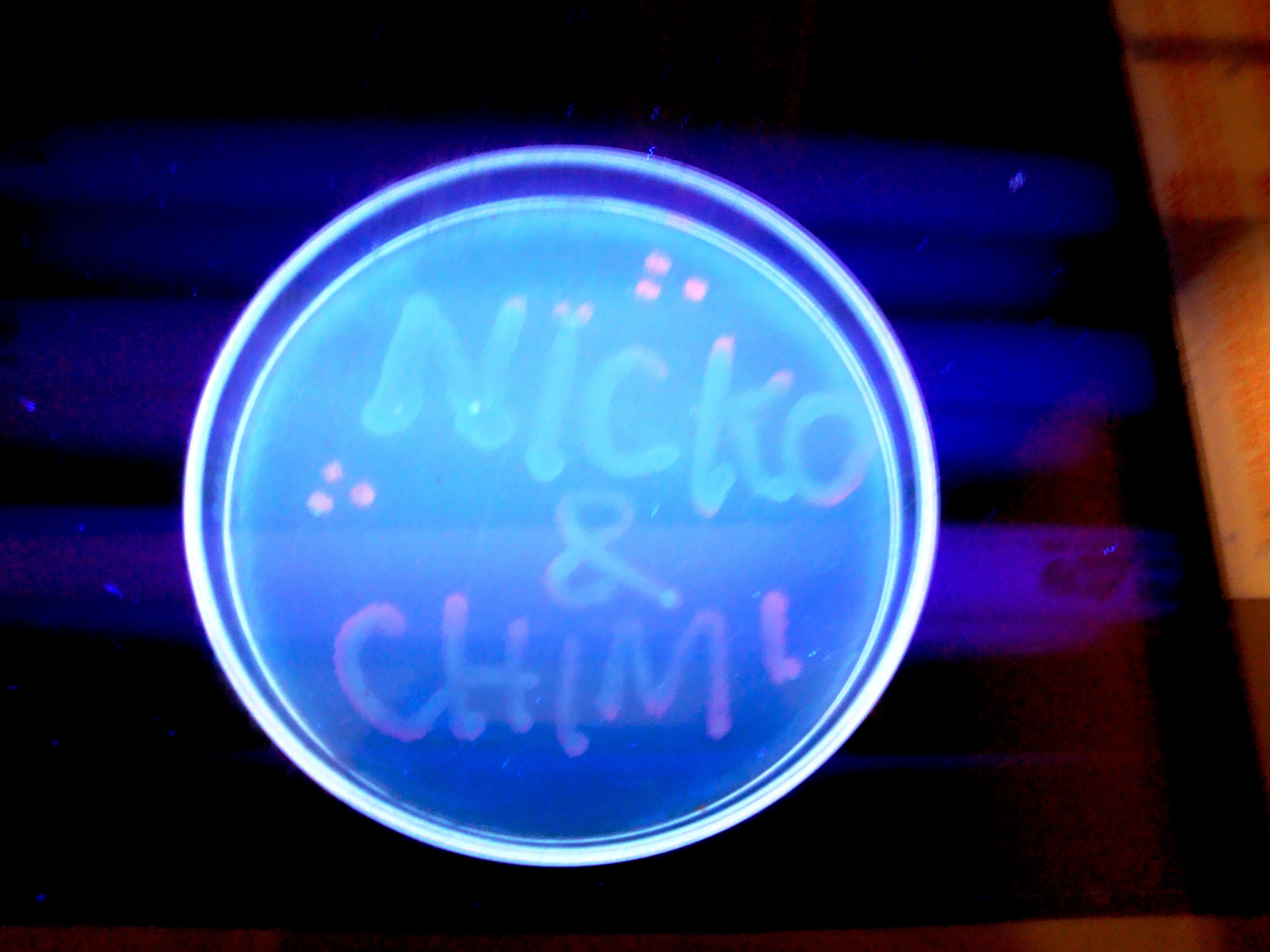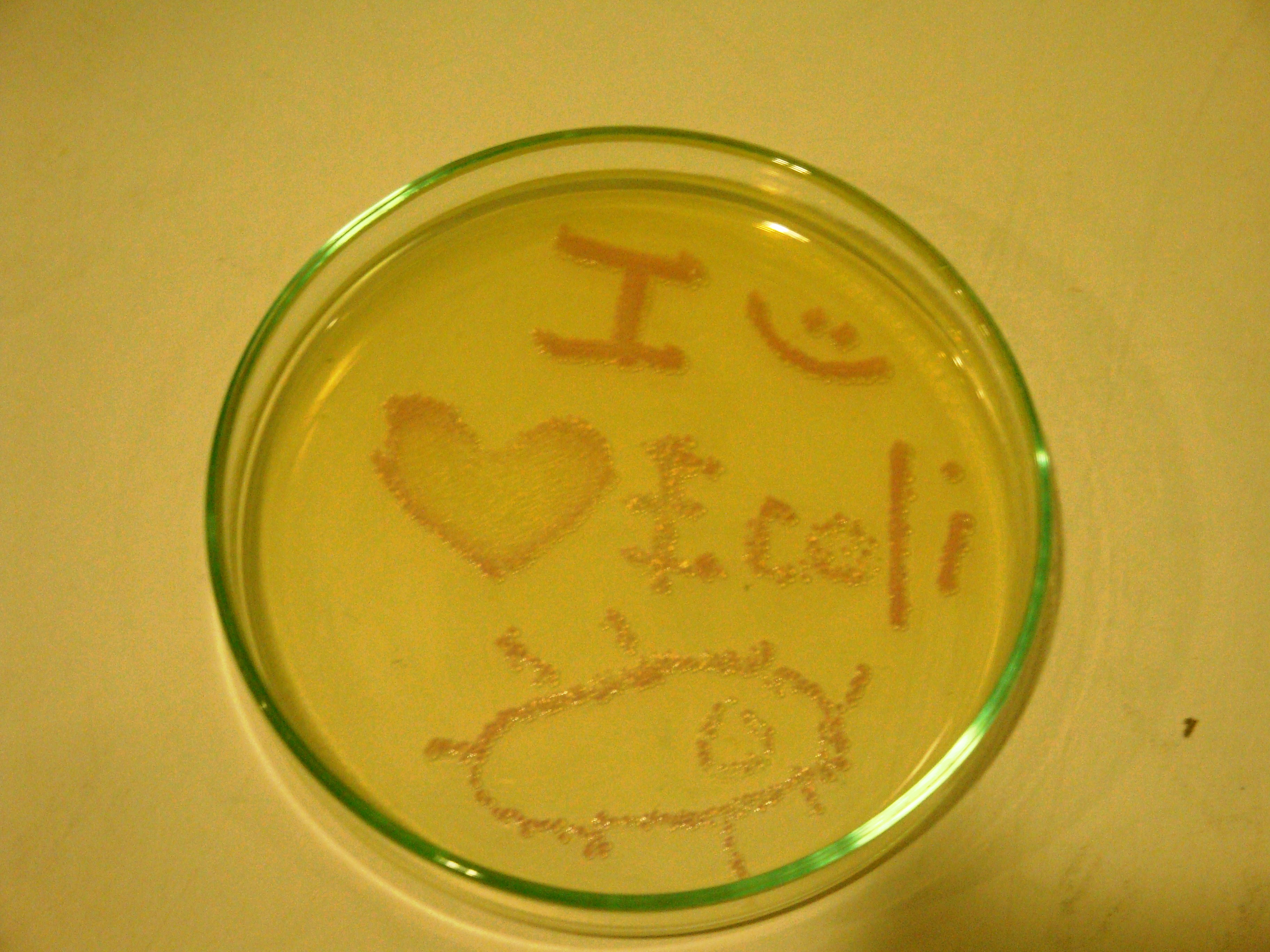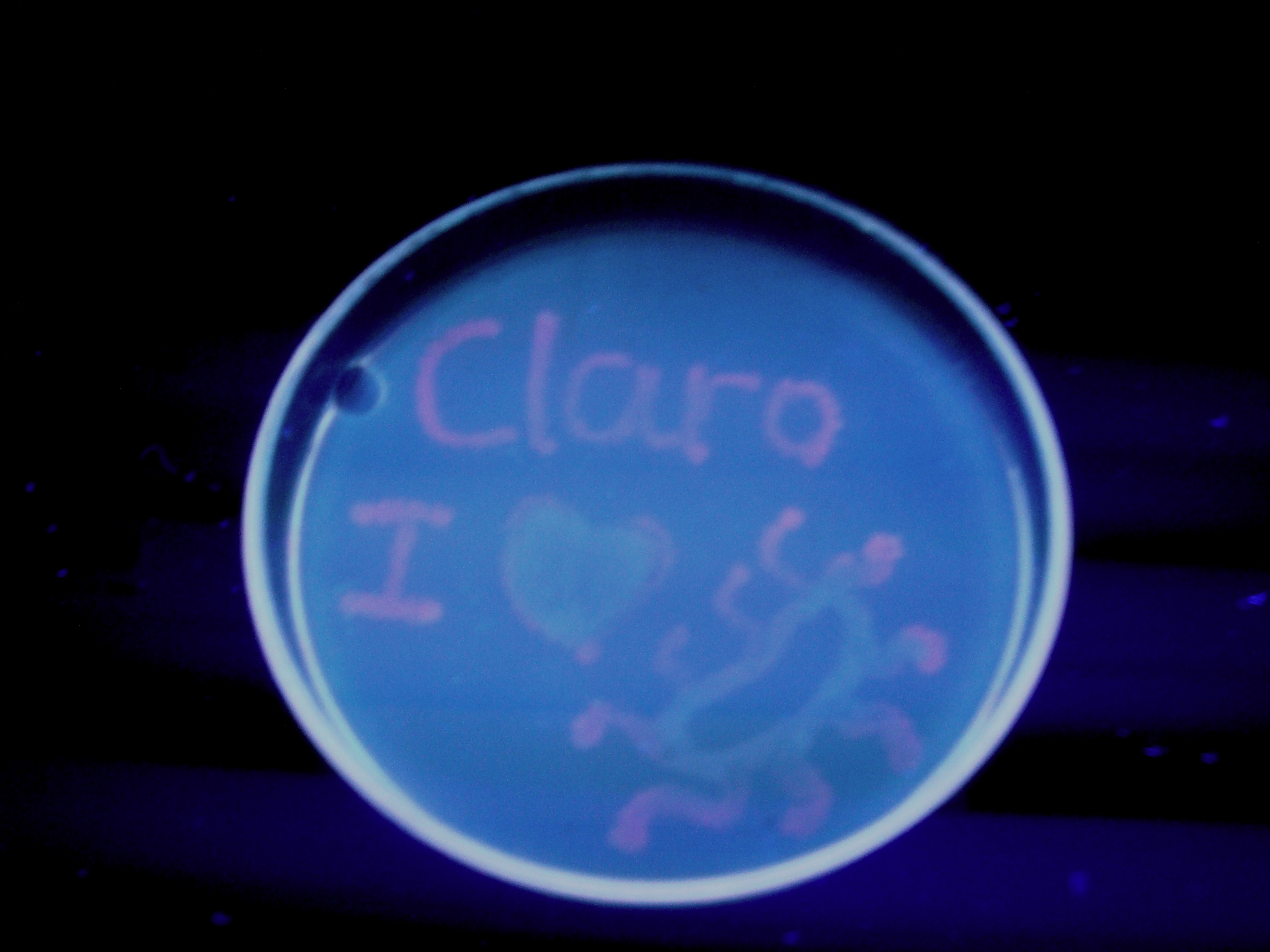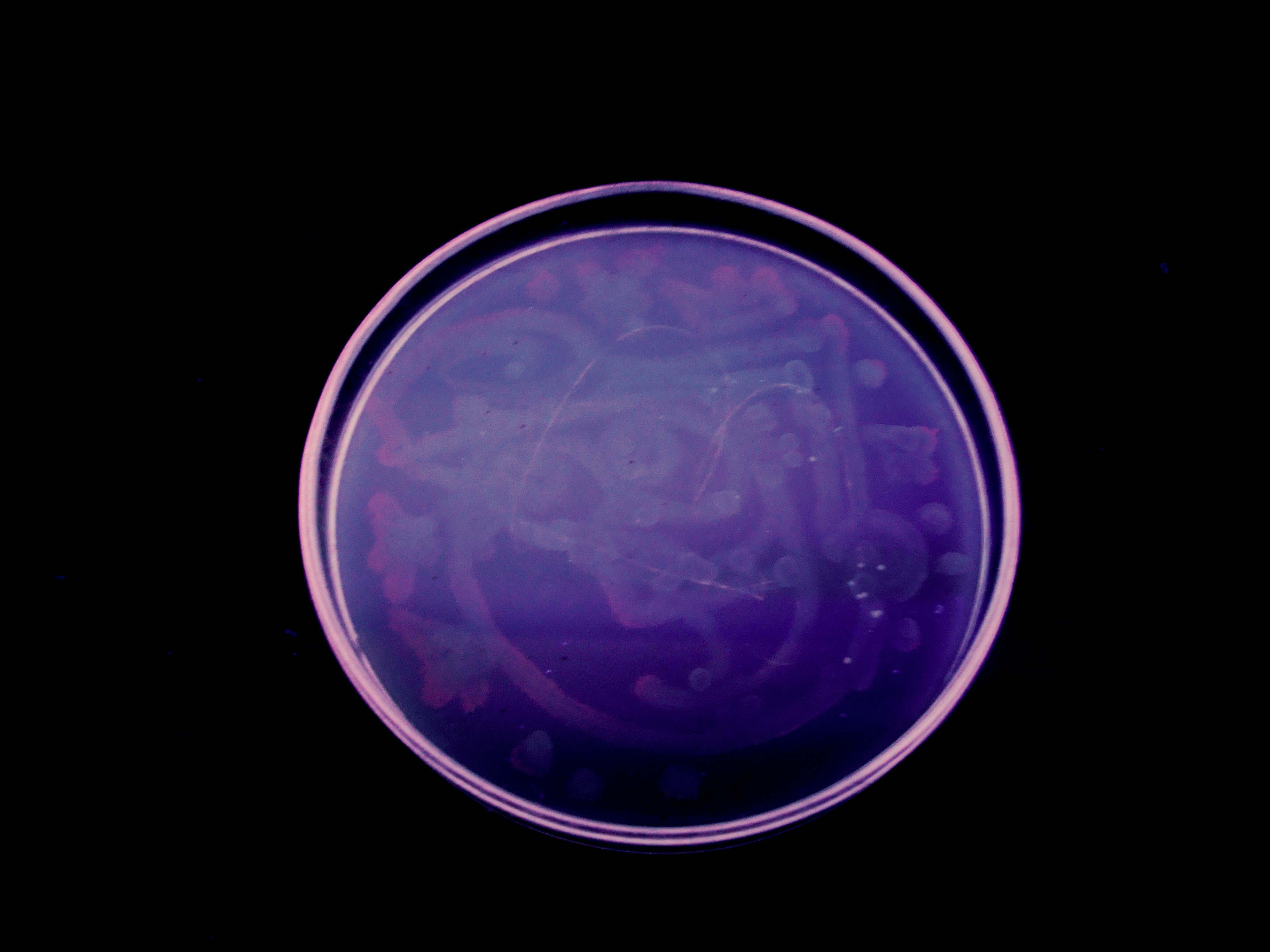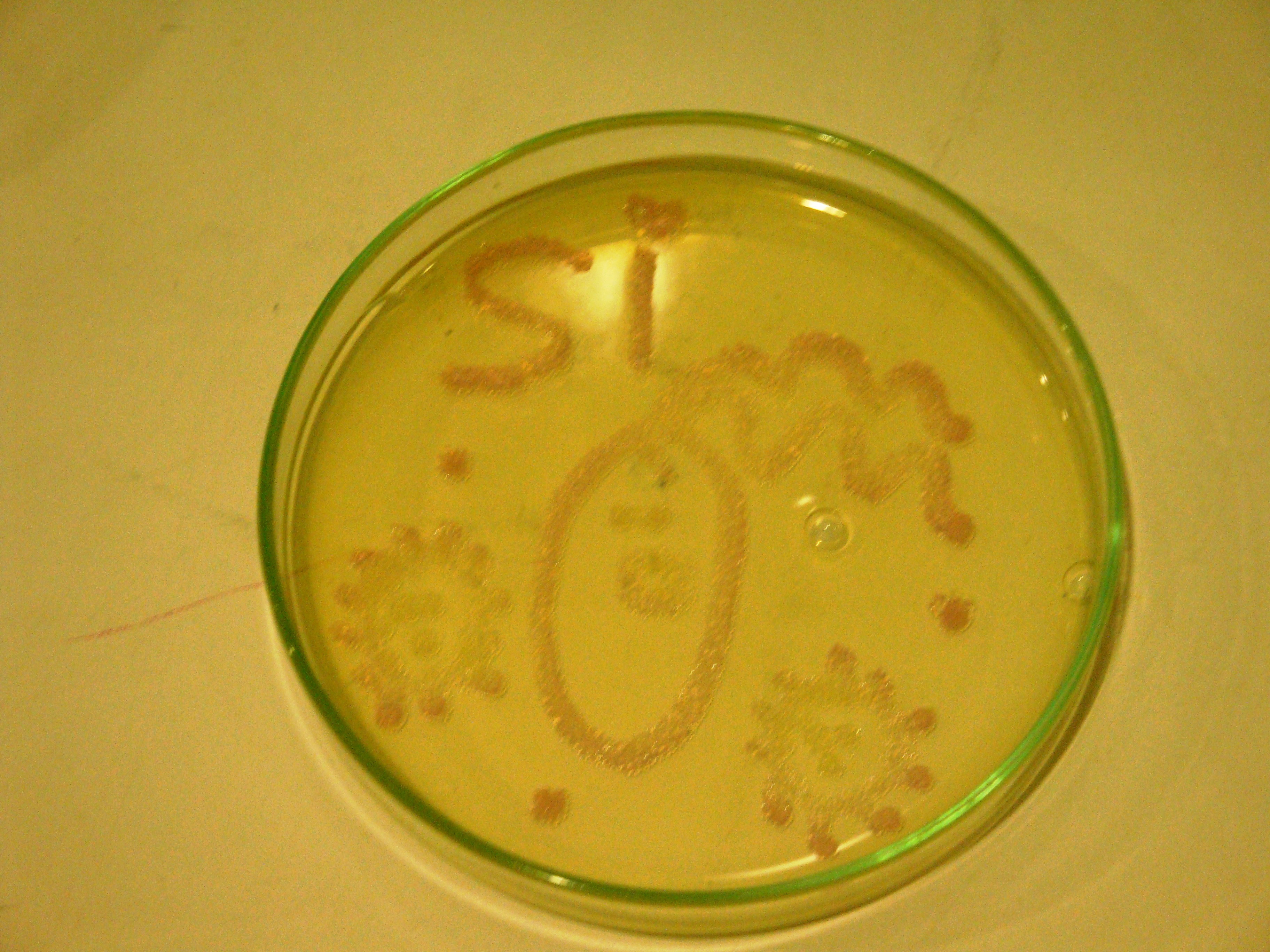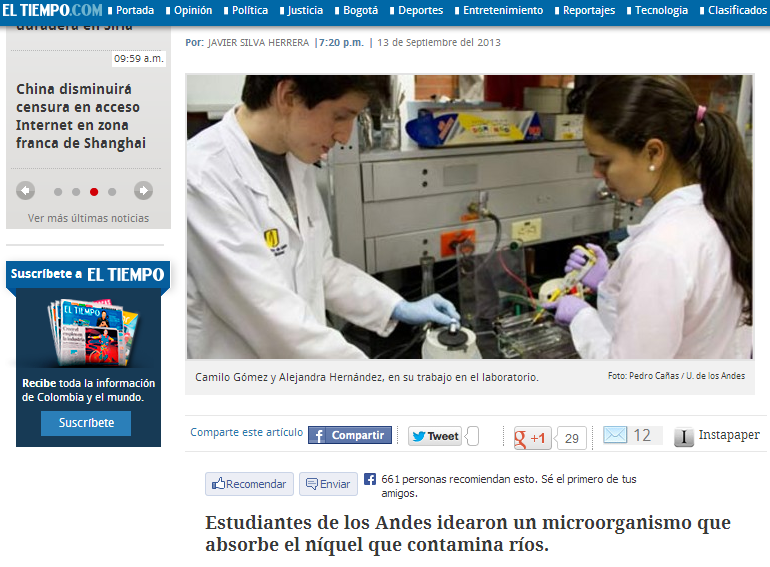Team:Colombia Uniandes/Educative
From 2013.igem.org
Contents
Human Practices
Educative axis
In this part of our Human Practices we performed activities focused to outreach and to promote knowledge about Synthetic Biology and about its impact in the society.
We were looking for non-scientific people, like common people in public places and highschool and undergraduate students, with whom we talked about Synthetic Biology, iGEM competition and our projects. We answered their doubts and we listened their opinions.
The activities that we developed in the educative axis of our Human Practices include informative conferences in schools, an exciting survey with bacteria, visits to parks and malls to survey and give information to people among others. As a final result of our work, we wrote about what we have been doing as part of iGEM competition to "EL TIEMPO", a important Colombian newspaper. When people at EL TIEMPO read our message,they were surprised and they wanted to help us to make our team and the competition public, so they wrote a page about us in their edition of September 14th. After that, many people wrote us asking for our projects and motivating us to continue in the competition, and of course, now we have more followers on Facebook and Twitter :)
The Activities
Visiting malls in Bogotá D.C.
As scientists, we are very interested in the difussion of science, in the creation of knwoledge and to educate. With this motivation we were walking down the streets of Bogotá D.C, surrounding important malls to talk with common people. We told them about synthetic biology, biotechnology in Colombia, iGEM and our projects. We answered their questions about this topic and we gave them informative flyers with the basic information that anyone interested must know about synthetic biology.
See our informative flyer about Nicko:
File:Nicoksflyer.pdf
Furthermore we did surveys aimed to know the perception or any previous concepts that people had about synthetic biology. We asked them:
- Do you know what synthetic biology is?
- What do you think when you hear "synthetic biology"?
- Do you belive that colombian scientist carry out research in genetics and genetic modification of organisms?
- Have you ever heard about iGEM competition?
- Do you drink water treated with genetic modified bacteria if the treatment is guaranteed as safe?
We asked these questions to 40 random people, obtaining very interesting results:
Only one person said "I have heard the term before" when we asked for synthetic biology, and nobody knew iGEM Competition. Everyone had a "good" idea about the science in Colombia, because they belived that research in genetics and genetic engineering is carried out in our contry, but they did not know what exactly is being done.
The things turned more intersting when we asked them "What do you think when you hear "synthetic biology"?" somebody said right words like "new functions", "artificial life" or "modifications", other people said unrelated words like "disposable" and was surprising heard unexpected words (for us) that too many people repeated, words like "Robots".
We show you the most frequent words that people said. The interesting ones, the strange ones, the right ones, etc.
The words we heard form people
Artifical Life
Jurassic Park
Robots
Nanobots
Imitation
Smart Trees
Diseases
Future
Biotechnology
Artificial plants
Superficial
To Create
Crosses
Replacement
Disposable
Create Life
New Functions
Modifications
Experiments
Ecology
Everyone would be agree with drinking water treated with genetic modified bacteria, but only if it is approved by the national institute responsible of the water surveillance.
Probably the most important fact in this experience was the good attitude which people listened us and their curiosity to know more about synthetic biology and about the colombian participation in iGEM.
Talking with families in a national park
In addition to our visit to malls, we visited the biggest public park in Bogotá D.C., "Parque Nacional Simón Bolívar", where we talked with people again. We were looking for families who give us the same information described above (the survey, the flyer and the feedback about their oppinion).
In this opportunity we also interacted with children to show them our pets, Nicko and Chimi. Children were very happy when we asked them a photo with us and with Nicko's picture. If you don't trust us, see the pictures ;)
- VIDEO?****
We would know the pets owners's opinion about Chimi!
With this goal we went to Agrocampo, one of the biggest pets market in the country to perform a six questions interview to the possible buyers of Chimi. We show the questions below:
- Do you know what synthetic biology is?
Although this question seems obvious, it is a very important question to ask because it is the way you can understand how much the public knows about Synthetic Biology. The 94% of the respondents did not know what synthetic biology was, so to continue with interview it was important to us that people have a clear concept and knew the broad field in which synthetic biology can be used today.
- Would you consider the use of synthetic biology to solve everyday problems?
Once we had explained what synthetic biology was, it was important for us to know if they would consider it a useful tool for solving everyday problems. And as a nice surprise, we find out that the 83% of the respondents see it as a very good solution.
- Do you think animals can suffer from stress?
If we are designing a biosensor for animal stress, it is important to know the opinion of the public about animal stress. 100% of the people interviewed consider animals can suffer from stress.
- Do you think stress may lead to health problems in animals? If your pet is sick, would you consider important to know if your pet suffers from stress?
But more important was to know if they consider stress as an important factor in their pet´s health. 98% of the people responded affirmatively to both questions.
- Would you use a product that censes stress in animals, produced from synthetic biology?
This question helped us to understand that Chimi not only would have a good use in veterinary clinics, but also in the daily lives of pet owners. And again as nice surprise the 98% of the people responded affirmatively to this question.
There were a total of 53 respondents and all who answered yes to the last question agreed to use the product if it were something external to the animal.
We also went to an stable and talk with a horse owner Juan Carlos González, he consider stress to be important in the health of his horses because it affects the behavior of the animals during competitions, he believes is important to know when the horse is suffering from stress because this way you can know if there is something wrong with the animal and the animal´s health before a competition.
Conferences in Schools
Many of us when were in the school, some years ago, didn't know what to study, even many of us loved science, but we thought that it was of other planet, or at least, of other countries. We want kids in Colombia can think about doing science, that's why motivating and teaching kids about synthetic biology is an import axis of our Human Practices.
At first, we were nervous and anxious because of the children's reaction, we feared to they didn't pay attention to us, but when we stood up in front of them and began to tell our fascinating projects, they were quiet and frequently raised their hand to ask questions about what we were saying. After we finished our speech, most of them came closer and congratulated us and did questions like: ¿Where can we study microbiology? or ¿How can I do what you do?. Many of them ask for our emails and facebook profiles because they wanted to follow our performance, so we think we reached our goals (:
We were in schools of three different departments of our country: Cundinamarca, Valle del Cauca and Santander. We didn't want to centralize our activities only in Bogotá D.C., where we study and live, so, we took advantage of the fact that many of us are from different cities around the country and when these members were to visit their families, they socialized in their schools our projects, iGEM competition and, of course, synthetic biology.
In conclusion this experience was amazing, we achieved our goals about difussion of knowledge but we also learned from the students and their points of view were an important contribution.
Don't forget you can see more pictures of these activities in our gallery!
Bacterial survey
Probably one of the most important and interesting parts in Microbiology is the direct work with microorganisms, this means, work with fungi and bacterial cultures, see how these organisms develope themselves trough time, see the colonies growing!
Acording to the above, if we want that people really understand our work and feel the same satisfaction with it, the best way was allow them to work directly with microorganisms in a fun way, so we invented the Bacterial Survey! We reserved a lab in our university, where we invited students of all undergraduate programs to know synthetic biology, iGEM, our projects and to answer a brief survey drawing with bacteria!
The question was: Could you use products made with synthetic biology, as Nicko and Chimi, yes or no? And draw whatever you want related with your answer.
Then we give them a Petri dish, a sterile hyssop and a culture of a non-pathogenic E. coli that overexpressed mCherry and Cyan Fluorescent Protein (CFP) as painting tools. See pictures of the process (8
We incubated the drawings at 37 °C while 24 hours and the next day we see them under UV light to take them pictures and send these pictures to the respective "artist", to make them be proud of their work. Here, we show the artworks to you :)
The results of this survey were jawdropping, not only we see creative drawings made with bacteria but everybody said "yes" as answer, this makes us feel at ease with our job, because of students have a great idea about the useful and safe tings that we can build with synthetic biology.
Mass Media
Visiting schools, malls and parks were good activities for teaching about synthetic biology and to get a feedback from people, but we thought that they were not enough for our objectives of the widest possible difussion, we looked for more, for a higher level of difussion, something that allows us to reach further. Then we appeal to mass media for this and we got good results.
Radio
iGEM Colombia Team was interviwed in a live boradcast of En Órbita, which is a radio program dedicated to inform about those things that make us be proud of humaninty, as its slogan says. This program belongs to Señal Colombia, a public colombian broadcasting station that issues educative contents nationally.
You can hear the interview (with English subtitles) and visit the official En Órbita 's page and Facebook profile below:
- Facebook Profile: En Órbita Facebook
- Official website: [http://www.enorbita.tv/ En Órbita official website]
- Señal Colombia: [http://www.senalcolombia.tv/ Señal Colombia]
The interview:
LALALALALALALALALA!!!!!!!!
As you could hear (or read) we were not only concerned to talk about our projects. We also wanted to let clear basic concepts in microbiology, for example that we can find bacteria everywhere but they are not always evil, indeed, they keep us alive and we can use them as usful tools.
Newspapper
As we mentioned above EL TIEMPO, an important national newspapper, published an exclusive review where our projects (Nicko and Chimi) and our participation in iGEM were mentioned
You can visit [http://www.eltiempo.com EL TIEMPO] and read the [http://www.eltiempo.com/vida-de-hoy/ciencia/la-superbacteria-que-limpiara-aguas-_13062625-4 review].
It is important to highlight the impact of this publication. It was in the top 10 of the most viewed and commented notices in September 14th.
Due to this publication a lot of people around the country learned about Niko and Chimi!
More activities on the other two axes:
Contents |
Human Practices
Educative axis
In this part of our Human Practices we performed activities focused to outreach and to promote knowledge about Synthetic Biology and about its impact in the society.
We were looking for non-scientific people, like common people in public places and highschool and undergraduate students, with whom we talked about Synthetic Biology, iGEM competition and our projects. We answered their doubts and we listened their opinions.
The activities that we developed in the educative axis of our Human Practices include informative conferences in schools, an exciting survey with bacteria, visits to parks and malls to survey and give information to people among others. As a final result of our work, we wrote about what we have been doing as part of iGEM competition to "EL TIEMPO", a important Colombian newspaper. When people at EL TIEMPO read our message,they were surprised and they wanted to help us to make our team and the competition public, so they wrote a page about us in their edition of September 14th. After that, many people wrote us asking for our projects and motivating us to continue in the competition, and of course, now we have more followers on Facebook and Twitter :)
The Activities
Visiting malls in Bogotá D.C.
As scientists, we are very interested in the difussion of science, in the creation of knwoledge and to educate. With this motivation we were walking down the streets of Bogotá D.C, surrounding important malls to talk with common people. We told them about synthetic biology, biotechnology in Colombia, iGEM and our projects. We answered their questions about this topic and we gave them informative flyers with the basic information that anyone interested must know about synthetic biology.
See our informative flyer about Nicko:
File:Nicoksflyer.pdf
Furthermore we did surveys aimed to know the perception or any previous concepts that people had about synthetic biology. We asked them:
- Do you know what synthetic biology is?
- What do you think when you hear "synthetic biology"?
- Do you belive that colombian scientist carry out research in genetics and genetic modification of organisms?
- Have you ever heard about iGEM competition?
- Do you drink water treated with genetic modified bacteria if the treatment is guaranteed as safe?
We asked these questions to 40 random people, obtaining very interesting results:
Only one person said "I have heard the term before" when we asked for synthetic biology, and nobody knew iGEM Competition. Everyone had a "good" idea about the science in Colombia, because they belived that research in genetics and genetic engineering is carried out in our contry, but they did not know what exactly is being done.
The things turned more intersting when we asked them "What do you think when you hear "synthetic biology"?" somebody said right words like "new functions", "artificial life" or "modifications", other people said unrelated words like "disposable" and was surprising heard unexpected words (for us) that too many people repeated, words like "Robots".
We show you the most frequent words that people said. The interesting ones, the strange ones, the right ones, etc.
| Artifical Life | Jurassic Park | Robots | Nanobots | Imitation |
| Smart Trees | Diseases | Future | Biotechnology | Artificial plants |
| Superficial | To Create | Crosses | Replacement | Disposable |
| Create Life | New Functions | Modifications | Experiments | Ecology |
Everyone would be agree with drinking water treated with genetic modified bacteria, but only if it is approved by the national institute responsible of the water surveillance.
Probably the most important fact in this experience was the good attitude which people listened us and their curiosity to know more about synthetic biology and about the colombian participation in iGEM.
Talking with families in a national park
In addition to our visit to malls, we visited the biggest public park in Bogotá D.C., "Parque Nacional Simón Bolívar", where we talked with people again. We were looking for families who give us the same information described above (the survey, the flyer and the feedback about their oppinion).
In this opportunity we also interacted with children to show them our pets, Nicko and Chimi. Children were very happy when we asked them a photo with us and with Nicko's picture. If you don't trust us, see the pictures ;)
- VIDEO?****
We would know the pets owners's opinion about Chimi!
With this goal we went to Agrocampo, one of the biggest pets market in the country to perform a six questions interview to the possible buyers of Chimi. We show the questions below:
- Do you know what synthetic biology is?
Although this question seems obvious, it is a very important question to ask because it is the way you can understand how much the public knows about Synthetic Biology. The 94% of the respondents did not know what synthetic biology was, so to continue with interview it was important to us that people have a clear concept and knew the broad field in which synthetic biology can be used today.
- Would you consider the use of synthetic biology to solve everyday problems?
Once we had explained what synthetic biology was, it was important for us to know if they would consider it a useful tool for solving everyday problems. And as a nice surprise, we find out that the 83% of the respondents see it as a very good solution.
- Do you think animals can suffer from stress?
If we are designing a biosensor for animal stress, it is important to know the opinion of the public about animal stress. 100% of the people interviewed consider animals can suffer from stress.
- Do you think stress may lead to health problems in animals? If your pet is sick, would you consider important to know if your pet suffers from stress?
But more important was to know if they consider stress as an important factor in their pet´s health. 98% of the people responded affirmatively to both questions.
- Would you use a product that censes stress in animals, produced from synthetic biology?
This question helped us to understand that Chimi not only would have a good use in veterinary clinics, but also in the daily lives of pet owners. And again as nice surprise the 98% of the people responded affirmatively to this question.
There were a total of 53 respondents and all who answered yes to the last question agreed to use the product if it were something external to the animal.
We also went to an stable and talk with a horse owner Juan Carlos González, he consider stress to be important in the health of his horses because it affects the behavior of the animals during competitions, he believes is important to know when the horse is suffering from stress because this way you can know if there is something wrong with the animal and the animal´s health before a competition.
Conferences in Schools
Many of us when were in the school, some years ago, didn't know what to study, even many of us loved science, but we thought that it was of other planet, or at least, of other countries. We want kids in Colombia can think about doing science, that's why motivating and teaching kids about synthetic biology is an import axis of our Human Practices.
At first, we were nervous and anxious because of the children's reaction, we feared to they didn't pay attention to us, but when we stood up in front of them and began to tell our fascinating projects, they were quiet and frequently raised their hand to ask questions about what we were saying. After we finished our speech, most of them came closer and congratulated us and did questions like: ¿Where can we study microbiology? or ¿How can I do what you do?. Many of them ask for our emails and facebook profiles because they wanted to follow our performance, so we think we reached our goals (:
We were in schools of three different departments of our country: Cundinamarca, Valle del Cauca and Santander. We didn't want to centralize our activities only in Bogotá D.C., where we study and live, so, we took advantage of the fact that many of us are from different cities around the country and when these members were to visit their families, they socialized in their schools our projects, iGEM competition and, of course, synthetic biology.
In conclusion this experience was amazing, we achieved our goals about difussion of knowledge but we also learned from the students and their points of view were an important contribution.
Don't forget you can see more pictures of these activities in our gallery!
Bacterial survey
Probably one of the most important and interesting parts in Microbiology is the direct work with microorganisms, this means, work with fungi and bacterial cultures, see how these organisms develope themselves trough time, see the colonies growing!
Acording to the above, if we want that people really understand our work and feel the same satisfaction with it, the best way was allow them to work directly with microorganisms in a fun way, so we invented the Bacterial Survey! We reserved a lab in our university, where we invited students of all undergraduate programs to know synthetic biology, iGEM, our projects and to answer a brief survey drawing with bacteria!
The question was: Could you use products made with synthetic biology, as Nicko and Chimi, yes or no? And draw whatever you want related with your answer.
Then we give them a Petri dish, a sterile hyssop and a culture of a non-pathogenic E. coli that overexpressed mCherry and Cyan Fluorescent Protein (CFP) as painting tools. See pictures of the process (8
We incubated the drawings at 37 °C while 24 hours and the next day we see them under UV light to take them pictures and send these pictures to the respective "artist", to make them be proud of their work. Here, we show the artworks to you :)
The results of this survey were jawdropping, not only we see creative drawings made with bacteria but everybody said "yes" as answer, this makes us feel at ease with our job, because of students have a great idea about the useful and safe tings that we can build with synthetic biology.
Mass Media
Visiting schools, malls and parks were good activities for teaching about synthetic biology and to get a feedback from people, but we thought that they were not enough for our objectives of the widest possible difussion, we looked for more, for a higher level of difussion, something that allows us to reach further. Then we appeal to mass media for this and we got good results.
Radio
iGEM Colombia Team was interviwed in a live boradcast of En Órbita, which is a radio program dedicated to inform about those things that make us be proud of humaninty, as its slogan says. This program belongs to Señal Colombia, a public colombian broadcasting station that issues educative contents nationally.
You can hear the interview (with English subtitles) and visit the official En Órbita 's page and Facebook profile below:
- Facebook Profile: En Órbita Facebook
- Official website: [http://www.enorbita.tv/ En Órbita official website]
- Señal Colombia: [http://www.senalcolombia.tv/ Señal Colombia]
The interview:
LALALALALALALALALA!!!!!!!!
As you could hear (or read) we were not only concerned to talk about our projects. We also wanted to let clear basic concepts in microbiology, for example that we can find bacteria everywhere but they are not always evil, indeed, they keep us alive and we can use them as usful tools.
Newspapper
As we mentioned above EL TIEMPO, an important national newspapper, published an exclusive review where our projects (Nicko and Chimi) and our participation in iGEM were mentioned
You can visit [http://www.eltiempo.com EL TIEMPO] and read the [http://www.eltiempo.com/vida-de-hoy/ciencia/la-superbacteria-que-limpiara-aguas-_13062625-4 review].
It is important to highlight the impact of this publication. It was in the top 10 of the most viewed and commented notices in September 14th.
Due to this publication a lot of people around the country learned about Niko and Chimi!
More activities on the other two axes:
 "
"




